
- You are here:
- Home »
- Blog »
- » Rotating Trailer Tires Guide (Trailer Tire Rotation Pattern)
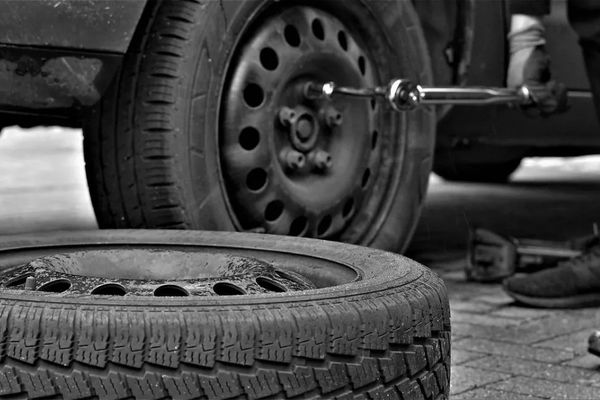

Rotating Trailer Tires Guide (Trailer Tire Rotation Pattern)
- August 24, 2023 /
- By James V.
Most people do not use their trailer that often to warrant thinking about rotating tires. Since the tires on a trailer are not steering or driving tires, the wear should be even no matter what. But that does not mean you can’t rotate your tires.
In most cases, trailer tires wear out due to sitting around too long and not doing anything. They do not get the mileage needed to require rotating them. If you tow a lot, then maybe you will get to that point but most trailer owners do not.
To learn more about this topic, just continue to read our article. It explores the issue so you have the best information about rotating trailer tires. Take a few minutes to see how this important information helps you with your trailer tires.
Do Trailer Tires Need To Be Rotated?
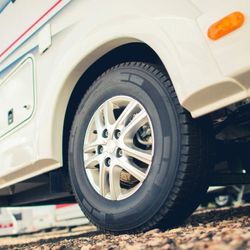
While some owners do rotate their trailer tires and even incorporate their spares in the rotation, this is not something that is mandatory. When you rotate your tow or passenger vehicle’s tires, you are doing that out of safety concerns.
There is no such safety issue when it comes to trailer tires. These tires rarely get the mileage needed to warrant rotating them. If they do and you see some uneven wear patterns, then you should investigate what is causing that uneven wear.
The uneven wear pattern is telling you something about the tires or the axles on your trailer. There may be a problem with both that you need to address. The trailer tires will wear out for other reasons.
Usually, those other reasons are dry rot and sun damage from not being moved very often. Or you did not put tire covers on your tires to protect them from UV rays. Those are the reasons why you may replace your trailer tires before rotating them once.
Should I Rotate Tires On a Dual Axle Trailer?
This is a depends situation. Some owners say that their tires age out before they get enough miles on them to warrant rotating their tires. This is probably the case for many trailer and 5th-wheel owners.
However, if you have a 5th wheel you may want to consider rotating the tires as the position of the nose of the trailer may cause more wear on one set than the other. One owner had his 5th wheel nose high.
What this did was cause a lot of extra wear and tear on the two rear axle tires. In fact, one tire came apart on him while traveling. The nose-high situation caused the blow out.
But as we said earlier, if you see uneven wear and tear on your tires, even with dual axles, it is a sign of another problem that you need to find and correct. In this case, the other problem was the 5th wheel being nose high.
Then some owners will rotate their tires because it does not hurt. They are right about that as well. Rotating the dual axle tires does not help much and they do not hurt anything.
Is it OK To Rotate Trailer Tires From Side To Side?
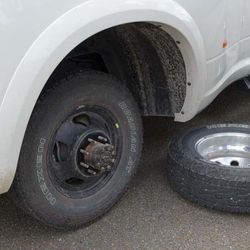
The word is that this action is acceptable but it is not ideal. The only time you do not do this move is when you have put directional tires on your trailer’s axles. Those tires have to keep rotating in the same direction when you move them.
Keep in mind that the pattern you use for your passenger vehicles or tow vehicles does not apply to trailers. But you can rotate them using the X method. Some owners do that and have had no problems.
But in the end, it is up to you if you are going to rotate your trailer tires. If you happen to have a triple axle trailer, then the X pattern is what you need to use when it comes time to rotate those tires.
The middle tires get swapped side to side in this configuration. Be careful about using the position of the tires as a sign you need to rotate them. When the trailer is empty the tires should be leaning slightly outward at the top.
When you are properly loaded, the tires will be straight up and down and when you overload the trailer, the tire tops will bow inward. These are not signs of the tires needing rotating but a sign of how your trailer is loaded.
How To Rotate Double-Axle Trailer Tires
The correct way to do this task is to make sure you swap the tires so that they are in the opposite position from where they started. This could mean an X rotation and that is usually the recommended method to use.
As you know, you never lift the tire off the ground before you loosen the lug nuts. Use the weight of the trailer to help you break the seal of the lug nuts before lifting the tire. You will need at least two jacks to do this work if you do not have a jack stand to help.
The X pattern goes something like this- front driver to the rear passenger side. Rear passenger side to the front driver position. Then the rear driver side to front passenger side and front passenger side to rear driver position.
If you are doing this by hand, it may take a little work to loosen those lug nuts. Tire shops will over-tighten the lugs just to protect themselves from any liability.
Trailer Tire Rotation Pattern
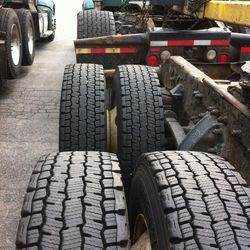
There is no real set pattern for single-axle tires. All you have is a side-to-side swap and you are done. For both dual and triple axle, you should use the X pattern described in the previous section.
The difficulty for the triple axle in using the X pattern is that the two middle tires only get swapped side to side. It is not hard to do this work if you have the right equipment.
The difference between doing it yourself and having a shop do it is that you do not have to over-tighten those lug nuts. There is a certain torque level for lug nuts and tire shops go beyond that torque level to be on the safe side.
Of course, you can do what many trailer owners do and never rotate your tires. According to one owner, there is no real advantage or disadvantage to rotating trailer tires. Your main concern will be dry rot or UV rays.
Which Way do Trailer Tires Go?
The tires should have the inside on the inside and the outside on the outside. This actually does matter as it could shorten the life of the tire significantly if you get this wrong. Goodyear made a big point about this on their website.
Then if you are buying and using directional tires on your trailer, then the directional arrow should be pointing in the direction of the correct rotation. Directional tires have treads that form a V shape and point down as well as forward.
If you get this wrong, you may not get the full benefit of the tire design. Asymmetrical tires roll in either direction but these tires need to have the inside on the inside and the outside on the outside when mounted.
There should be a notice on the tire that tells you which side faces out. It pays to read all the writing on the tires as they give you very important information about those tires.
Can You Drive a Dual Axle Trailer With 2 Tires?
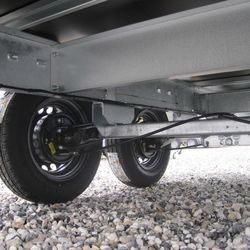
It is possible but it is highly recommended that you do not try this. With only two tires holding the weight of the trailer, you are putting your family and trailer at risk. You will lose stability as well as lower your towing experience.
There will be a lot of weight and stress on the remaining tires. This means that you run the risk of a blow out happening. This is not a chance you want to take. This includes running a dual axle trailer with just 3 tires.
While in emergency situations you can do this, it is best to have a roadside emergency membership to tow you to the nearest repair center. That is the better option when you face this problem.
You may think you are saving money by only running two tires but in the end, it could cost you a lot more than buying two more tires and being safe.
Some Additional Words
It is up to you if you rotate your trailer tires or not. Uneven wear is not a priority for most trailer owners as they do not put enough miles on their trailer tires.
What is a priority will be dry rot and UV rays. Not moving your trailer for long periods of time is more of a risk than not rotating those tires. In the end, you make the decisions for your trailer and pick the best option for you.
Related Posts
How Long Do 22.5 Tires Last? (Truck Tire Life Expectancy)
Are Freedom Hauler Tires Any Good? (Trailer Tires Reviews)
Best Tires For E450 Motorhome (Tire Size and Pressure)
Leave a Comment:
Do You Need to Rotate RV Tires Regularly?
By: Author The Drivin' & Vibin' Team
Posted on September 17, 2021
For anyone that travels in an RV full time or even a significant portion of time, tire rotation really should be part of your maintenance routine.
But what does that look like? How often should you rotate RV tires? How do you rotate RV tires?
Let’s take a look at the facts to find out!
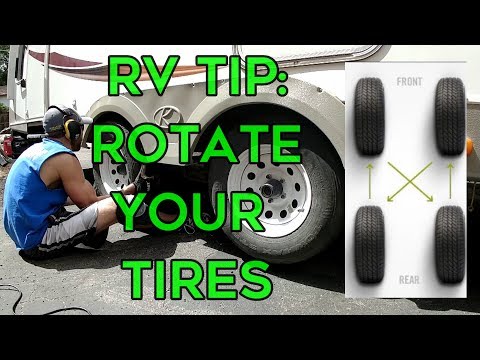
Do RV Tires Need to Be Rotated?
Yes, you should rotate your RV’s tires. Just like any vehicle, RV tires suffer wear and tear from normal use. That includes uneven wear because of normal driving and issues such as mechanical problems that accelerate tread wear.
Most experts recommend you rotate your tires every 6,000 to 8,000 miles. If your owner’s manual gives you more specific information about tire rotation, follow that.
If you don’t use your RV often, you may not need to rotate the tires before it’s time to replace them. However, if you don’t rotate your tires, they could dry out and crack.
Driving on them helps to keep them supple. So if you don’t drive your RV regularly, especially if your tires sit in UV rays, they can become unsafe even before it’s time to rotate them.
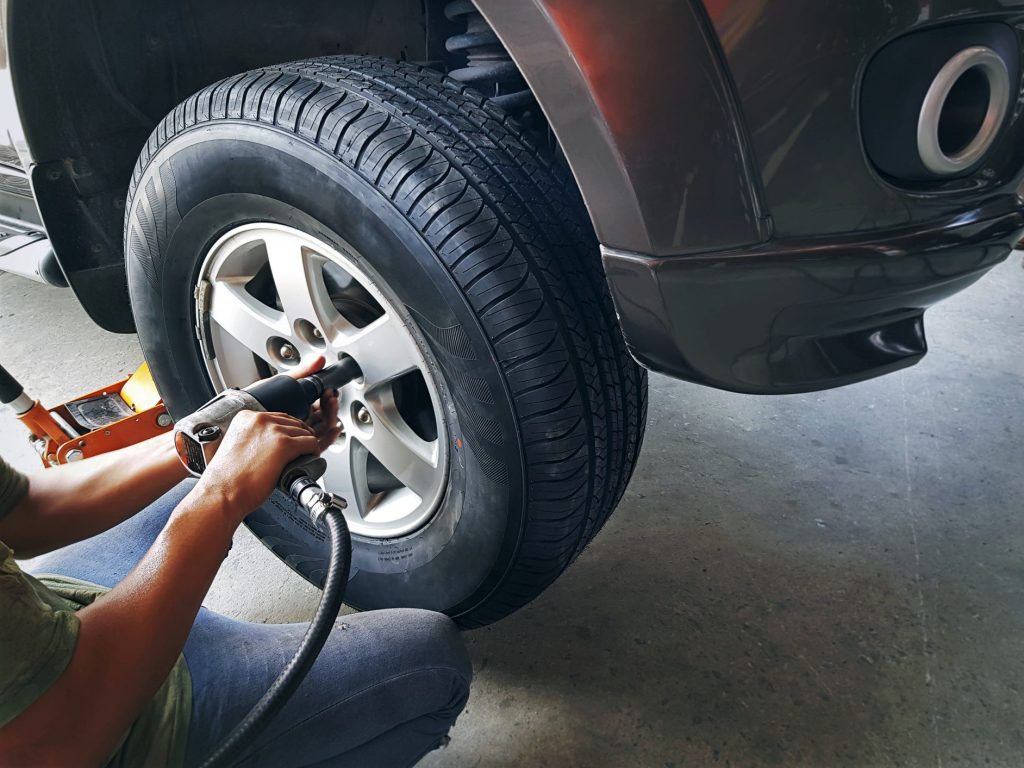
Why Are Tire Rotations Important?
Tire rotations are important for a few reasons. First of all, safety. If tires wear unevenly, it can affect drivability and increase the chances of blowouts or other dangers. Having your tires wear more evenly is also good for the overall condition of your rig. If the tires are wearing evenly, there will be less vibration while driving.
Rotating your RV tires can also save you money. The main point of tire rotation is to get even wear across all of your tires, which makes them last longer. The bigger the RV, the bigger the savings when it comes to avoiding tire replacement. In addition to maximizing tire life, rotating tires lets you give them a spot check.
Pro Tip: By rotating your tires, you allow them to wear evenly making a tire blowout less likely. We came up with more tips to prevent tire blowouts here: 7 Tips to Prevent an Awful Accident .
Which RV Tires Should You Worry About Rotating?
You should pay attention to all your tires when it comes to rotation. Under normal conditions, the front tires will often wear out first. That’s because they do the brunt of the work when turning. Rotate your front tires more often, especially if the rear tires are “duallys,” meaning they come in sets of two on each side. However, you should also check your duallys.
Pro Tip: The U.S. Tire Manufacturers Association has laid out specific instructions on properly rotating tires on a vehicle with duallys.
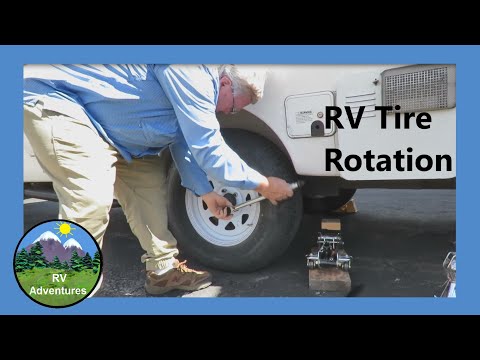
Be on the Lookout for These Tire Troubles
There are several telltale signs that you need to rotate or replace your RV tires. The best way to know is by routinely checking your tires. While you do, look out for these warning signs.
Lodged Objects
Objects such as rocks and other debris can get lodged in the tire tread. This can throw off the balance of your tires or cause added vibration while driving. This leads to additional wear and damage on your tires.
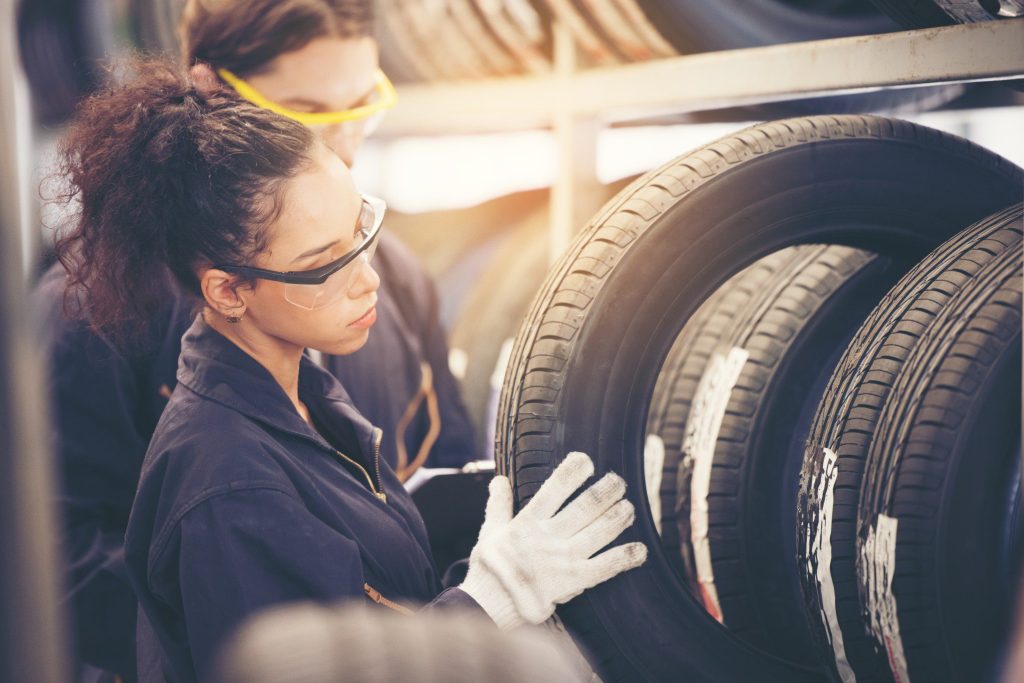
Sidewall Cracks and Bulges
Manufacturing imperfections or your tires sitting exposed to the elements can cause cracks or bulges. If you notice cracks or bulges, you’ll probably need to replace the affected tires.
At a minimum, rotate the tires so that the damaged tires no longer take the brunt of the load. Get the damage inspected by a professional so you know for sure if you can still use the tires.
Tread Issues
Tread issues typically take the form of uneven wear. It happens as a matter of normal usage, particularly on the front tires, which handle initiating turns. Uneven wear can also be a symptom of other issues.
Underinflation or overinflation, out-of-balance tires, or poor alignment can cause uneven tread wear. Deeper mechanical issues, such as worn-out or broken suspension parts, can also cause uneven tread wear.
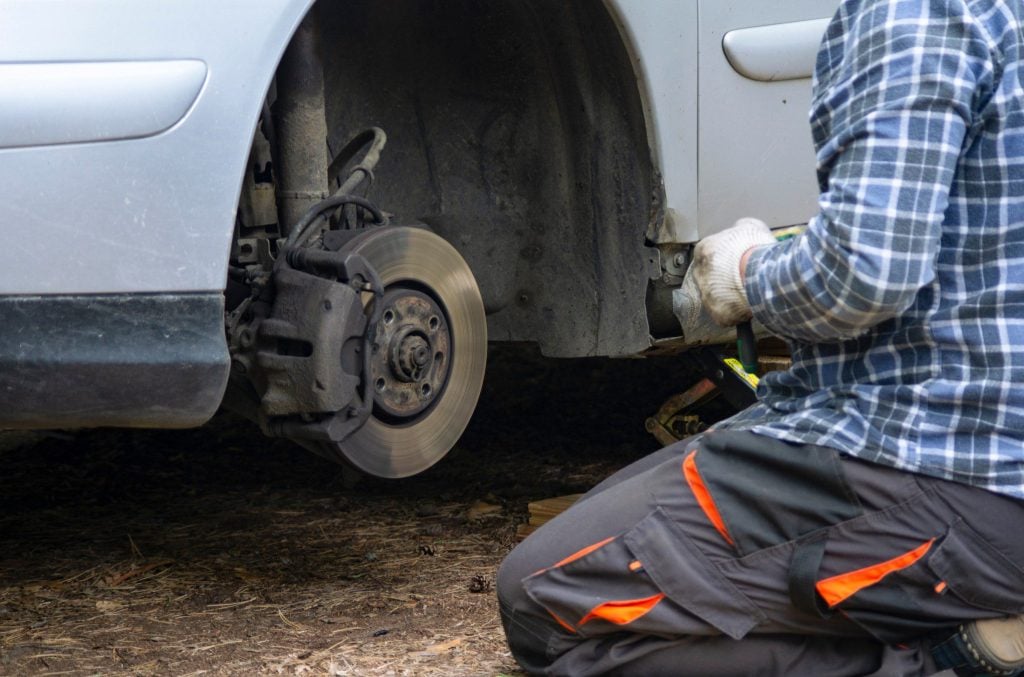
Weathering is more of an issue on an RV that sits idle. Tires that sit for long periods may dry out and develop cracks. This increases the risk of tire blowouts and can cause the tread to separate from the tire itself. If you’re going to park for a few weeks or months, put weather covers over your tires to protect them from the sun.
Keep in Mind: RV tires are different than car tires, so make sure you have the right type for your vehicle. Want to know if special tires are necessary for you? Read more about: Do All Types of RVs Need Special Tires?
Where Can You Get Your RV Tires Rotated?
If you’re a handy do-it-yourselfer, you can rotate your RV tires yourself. But RVs are much heavier than passenger vehicles and require jacks and stands that can handle that weight. If you don’t know if you have the appropriate equipment, don’t risk it.
Not a do-it-yourselfer or don’t have the appropriate equipment? That’s not a problem. Depending on the size of your rig, you can pull up to most tire shops, and they’ll rotate your tires. Call a tire or repair shop that specializes in RVs or large trucks. These will have the appropriate equipment to handle the increased weight and size of an RV.
You could also try mobile RV repair services. Make sure they understand the size and weight of your rig before coming out. Ensure they have the right equipment to handle heavy vehicles.
Another option is an RV dealership. Unless your rig is under a warranty that includes RV tire rotation, a dealership will probably be the most expensive option, though.
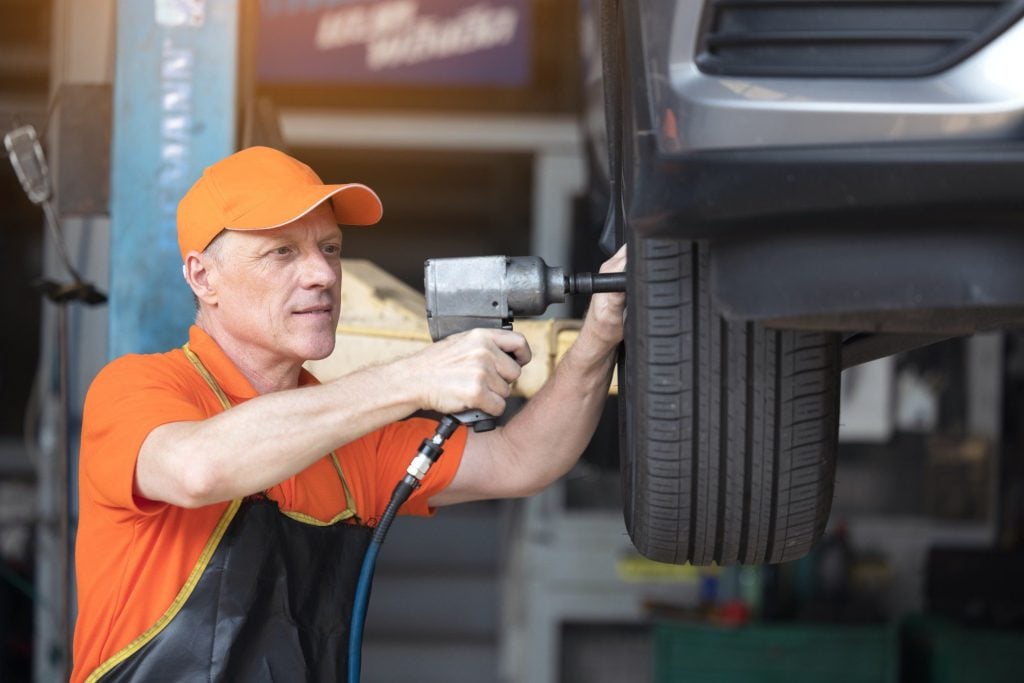
Do Trailer Tires Need to Be Rotated Too?
Like the tires on your vehicle, trailer tires wear down over time and require rotation. But also like your vehicles, keep an eye on your trailer tires for uneven wear.
Things like wear down the middle of the tire tread can mean that your tires are overinflated. More wear on the outside edges could indicate underinflation. Too much wear on one side of the tires versus the other might mean your trailer is overloaded to one side.
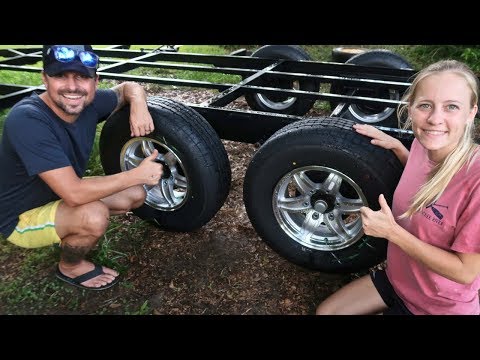
Should You Worry About Rotating Your RV Tires?
If you’re full-time in your RV or do a lot of traveling, make examining your tires for tread wear a regular routine. Stay on top of periodically rotating your tires.
However, if you don’t travel regularly, you should focus on protecting your tires during storage. Keep your RV out of the elements in a storage garage or use tire covers.
Tire maintenance comes with owning an RV. If you travel a lot or are a full-timer, you need to rotate your RV tires regularly. Make it part of your routine, and you’ll take the hassle out of tire maintenance. How do you take care of your RV’s tires?
Discover the Best Free Camping Across the USA
To be honest with you, we hate paying for camping . There are so many free campsites in America (with complete privacy).
You should give it a try!
As a matter of fact, these free campsites are yours. Every time you pay federal taxes, you’re contributing to these lands.
Become a FREE CAMPING INSIDER and join the 100,000 campers who love to score the best site!
We’ll send you the 50 Best Free Campsites in the USA (one per state). Access the list by submitting your email below:
This is the most useless pile of click bait crap I have ever seen. So how should you rotate duallies?

- May 4, 2022
Is It Necessary To Rotate The Tires On A Travel Trailer?
Whether your new to RVing or if you have doing it for some time, keeping your rig in peak mechanical condition is a major part of a successful RV camping trip. While we all do our normal maintenance when it is needed, one question seems to be weighing on a lot of our minds. “Do you need to rotate your travel trailer tires?”.
Let’s jump in…
This post may contain affiliate links. As an Amazon Associate, we may earn a commission on qualifying sales at no extra cost to you.
Do I Need To Rotate The Tires On My RV?
Keeping the tires rotated on passenger vehicles is very important for a few key reasons. The main reason is safety. We rotate them to ensure even wear on each tire over time. Having tires that wear evenly greatly reduces the chances of a blowout or other dangerous situation. In addition, keeping your tires rotated can save you tons of money in the end by extending the life of the tires.

Motorhomes, like passenger vehicles, should have their tires rotated at intervals recommended by the tire manufacturer. These tires are driving, turning, and managing the different aspects of the road. Keeping your motorhome tires balanced and rotated will not only extend the life of the tires, but it will also improve safety, increase fuel efficiency, and provide a smoother ride.
Travel Trailers
When it comes to the tires on your travel trailer, there is no real need to have them rotated. Many RV owners have found that their tires do not wear out because of mileage put on them. They wear out due to sitting in one place too long, dry rot, and damage from the sun. The result is needing to replace the tires before reaching the recommended mileage to have them rotated.
In the case of flat spots on your travel trailer tires, the flat areas should smooth out after just a couple of miles of pulling your camper. Rotating the tires on your camper will not do anything to remedy this. Towing your camper regularly will keep the tires soft and more supple.
If you notice unusual wear on your camper tires, you may have an underlying issue that needs to be addressed.
What Causes Premature Wear On My Camper Tires?
If you notice signs of unusual or premature wear patterns on your travel trailer tires, having your tires rotated will not do any good. If your tires are wearing down the center of the tire, the tire may be overinflated. On the other hand, if the tire is wearing on the outside edges, it may be underinflated.

Always make sure your RV tires are properly inflated to the manufacturers recommendation before every trip and periodically during your trip.
If you notice other abnormal wear patterns in your travel trailer tires, you may have bigger issues. You could have an issue with the frame, or the axles not being aligned properly. If you believe this to be the case, take your rig to a qualified RV tech or mechanic to investigate further.
Other Factors That Affect Tire Wear
Although there is no need to rotate your travel trailer tires, some RV owners will have them balanced on a regular basis. A balanced tire will provide a smoother ride and reduce vibrations at higher speeds. A few more factors that affect how your camper tires wear are weight, weather, alignment, and of course, improper tire pressure. To get the most out of your tires always pay special attention to the following:
Tire Pressure
The main cause for tire blowouts is over and under inflated tires. Maintaining proper air pressure in your travel trailer tires is one of the most important parts of RV safety. In addition, having the incorrect tire pressure can significantly affect the wear on your tires.
As a rule of thumb for every RVer, NEVER tow your camper when is overweight. Carrying too much weight is not only dangerous, but it can also cause your travel trailer tires to wear much faster. In addition to tire wear, being overloaded can cause serious damage to your rig.
The final reason your travel trailer tires wear out is weather. The suns UV rays can play havoc on tires, from dry rot to sidewall cracks. If your rig is going to be parked in one place for an extended period, consider investing in a set of good, durable tire covers for your travel trailer.
Axle Alignment
If your travel trailer is pulling to one side, it may need to have the axles aligned. Not only will this cause uneven wear to your travel trailer tires, but it may also pose a serious safety threat to you or the people driving behind you.
If you believe your axles need to be aligned, contact a qualified RV technician or if you are a mechanically inclined DIYer, you may be able to manage the task yourself.

What Other RV Owners Say
I read several entries in an online forum relating to the issue of rotating travel trailer tires and wanted to share some entries with you.
Newt writes, “Very few RVers will wear the tires out before they age out.”
TT writes, “On my previous trailer, I rotated the tires because there was some uneven wear caused by a change to a larger, wider tire according to the alignment shop.”
SKP writes, “We rotated because with our triple axle fiver we saw more scrubbing wear on the front axle’s tires than on the other two. By rotating we got more even wear and since we had the wheels off to check the brakes and bearings anyway, it was no more effort to rotate.”
In Conclusion
When it comes down to it, the decision on whether to have your travel trailer tires rotated depends on your own personal preferences. If you are a full-timer, you may put enough miles on your tires to justify the cost and effort of rotating them. For weekenders, the chances of you putting the miles on your tires is slim. We have never had to rotate our travel trailer tires. They need to be replaced before that happens.
What are your thoughts on rotating travel trailer tires? Do you rotate yearly? Every 3,000 miles? Drop us a comment below and let us know.
Subscribe To Our Monthly Newsletter
You might also like:.

Sharing Is Caring
Leave a comment.
You must be logged in to post a comment.

Should You Rotate The Tires On Your Travel Trailer?
by Glynn Willard | May 6, 2023 | Fulltime RV Living | 0 comments
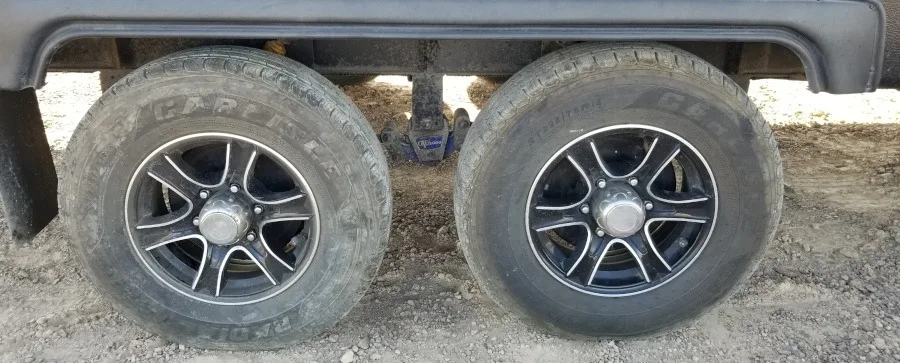
Last Updated on 04/07/2024 by Glynn Willard
Your Blog Post with Divi-Style Box
Should You Rotate Tires On Your Travel Trailer?
Ultimately, yes, it’s a good idea to rotate the tires on a travel trailer.
Rotating your tires on your travel trailer might be controversial and in some cases unnecessary.
But after towing a travel trailer all over the country for over 35,000 miles, I’ve made a few observations.
First and foremost, tire and wheel care on your travel trailer should be every RV owners number one priority for the sake of safety.
So again, some will say tire rotation is not necessary. Let’s see if it is for your situation.
For the duration of this article, I’ll be discussing tire rotation on dual axle travel trailers, but it still applies to a fifth wheel.
Why Rotate The Tires On A Travel Trailer?
It doesn’t take much in the way of axle alignment and your suspension system to have one or more tires with uneven wear.
Some of the misalignments might be negligible and take a while to present themselves.
You can counter this through regular rotation of your tires so that all tires can wear evenly.
Of course, if there’s a lot of tire wear on one tire in particular, it’s time to take additional measures.
We did an entire video about checking your wheel alignment and changing the bushings and shackles.
Check out the article:
Uneven Tire Wear On Your Travel Trailer. Is It A Bent Axle?
Or watch the video 🙂
How Often Should I Rotate My Trailer Tires?
I never went with a quantified schedule. I’ve read everything from every 3000-6000 miles.
That’s quite a spread! So, I just watched for wear patterns and rotated them spontaneously.
I found it good practice to do regular tire inspections to watch for the tiniest bit of wear and then rotate.
It was part of my constant maintenance of checking the bearings, brakes, lug nut torque, and suspension.
Overkill? No way! That was my house with everything we needed to live off-grid for my family. Definitely not overkill.
Besides, I learned the hard way after one of our wheels fell off to always do proper preventive maintenance.
And yes, I did a lot of this maintenance right on BLM land with no issues. I also never left a mess or disrupted the land in any way.
I write that in the past tense because we have since sold the trailer and purchased a Roadtrek Zion campervan .
What’s The Rotation Pattern For Travel Trailer Tires?
Again, I’m only discussing rotating tires on duel axle travel trailers.
But, if you have a single-axle trailer, rotate side-to-side since the direction of rotation is likely not an issue.
It always made the most sense to move the front tires to the back and form an X pattern (criss cross) for the rear tires to the front.
In other words, front to back on the same side. Then rear passenger moves to the front driver and the opposite for the opposite side.
This has been standard in the automotive industry on passenger vehicles for decades.
If for some reason you have directional tires, swapping the same side from the front axle to the rear axle will be necessary.
Should you rotate your spare tire into the mix?
This is debatable and opinion-based.
I kept my spare out of the mix to make sure it was worthy in case of an emergency.
If your spare tire has the same tire and aluminum wheels as the other wheels it’s fine to rotate it into the mix.
Lastly, make sure you rotate the tires on your tow vehicle too. The rear tires bear a heavy load and should be rotated regularly.
Craving Video? Visit Our Channel
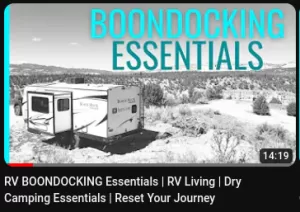
Why Not Rotate RV Tires?
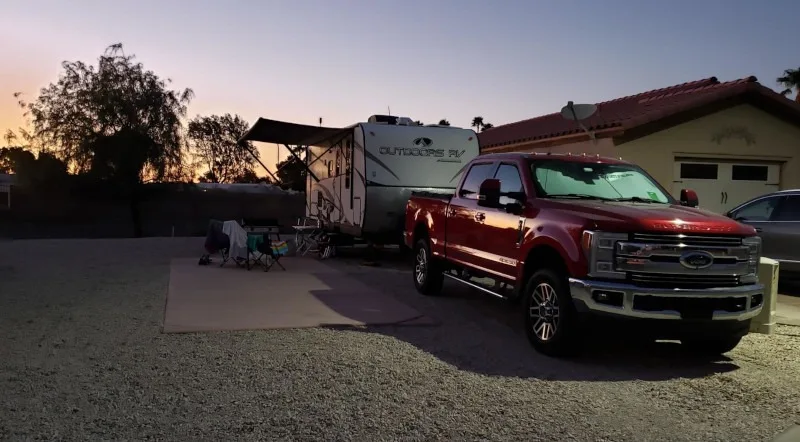
If you move very infrequently with low mileage, it’s not necessary.
Your tires will likely rot from sun exposure if uncovered or develop flat spots before they present tread wear from road use.
But really, this article is for those of you who move/travel frequently or live full-time in your travel trailer.
Should You Balance The Tires On Your Travel Trailer?
When I first purchased my travel trailer, I never thought about this. Then I had a fleeting thought.
Do travel trailer tires need to be balanced? I thought about the physics and the answer was a no-brainer.
After speaking with many specialists, my conclusion that you should balance your trailer tires if you have dual axles was correct.
It minimizes the jarring on your suspension and equates to a smoother ride.
Besides, balancing the travel trailer tires costs so little at a local tire shop, it’s cheap insurance.
Therefore, based on my experience, yes you should balance travel trailer tires.
Premature Wear On Your Trailer Tires
There are a few potential contributing factors that can cause one of the tires on your travel trailer to present unusual wear.
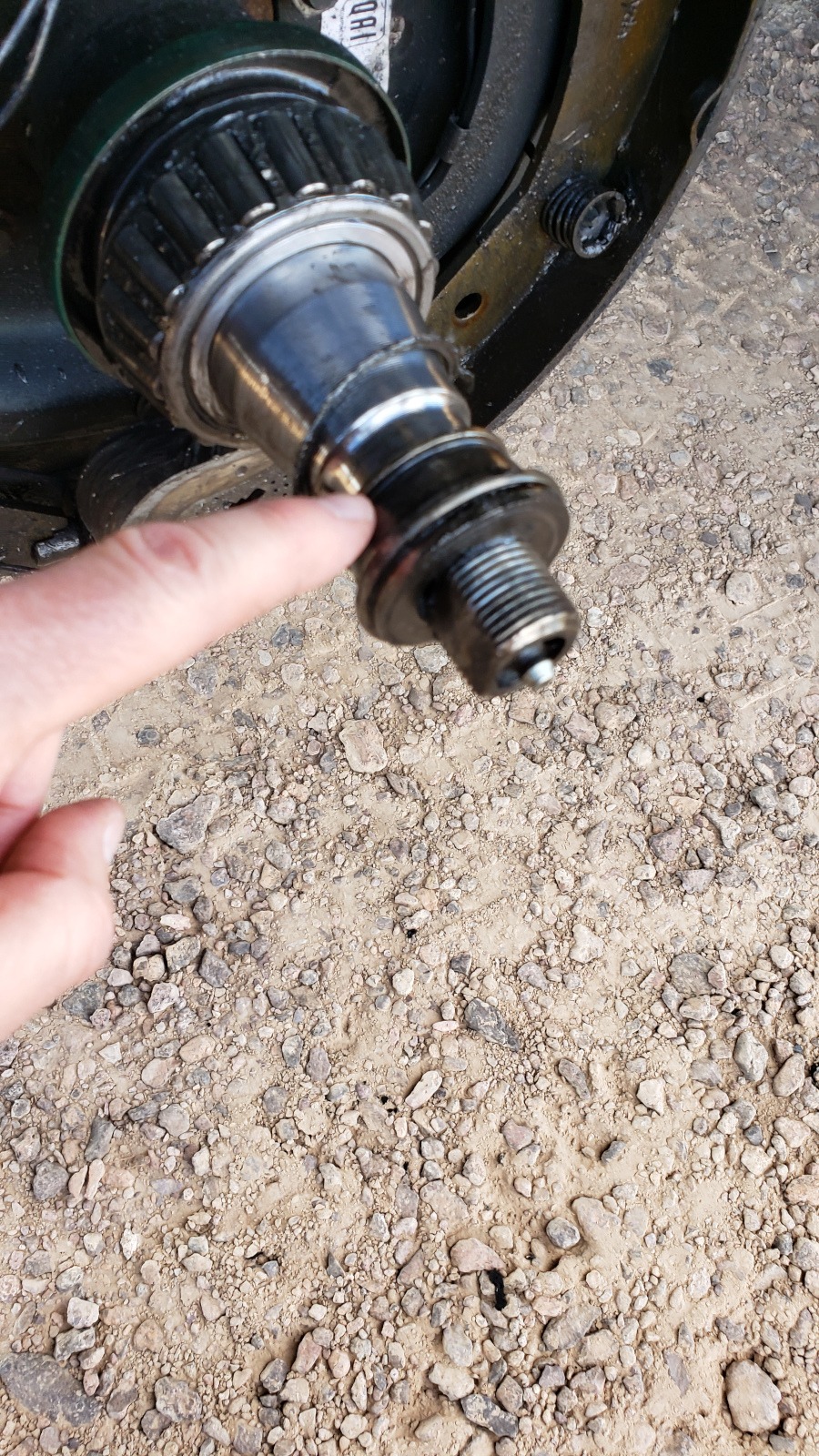
The outer bearing race was almost welded to the spindle.
- Axle Alignment: What this means is that there’s a small discrepancy in the axle spindle. It can be corrected professionally.
- Worn bushings and shackles: This was my issue. Replacing all the components took care of 90% of the problem.
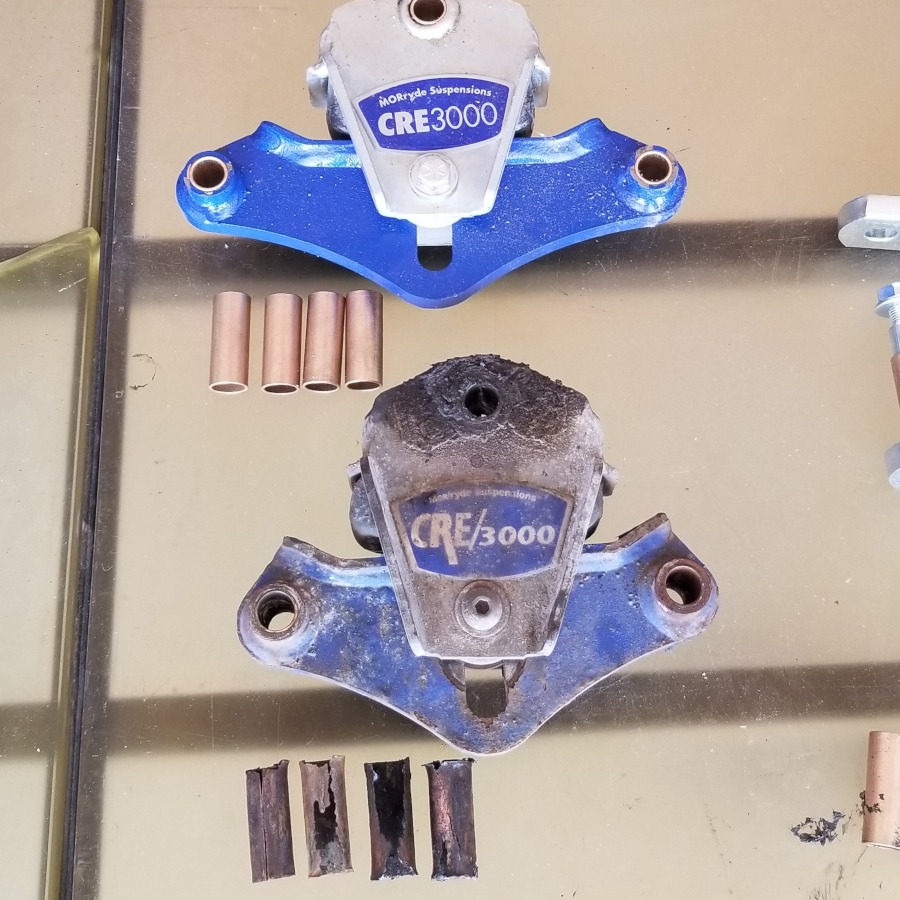
The new and the old MorRyde CRE3000.
- Tire Pressure: If you don’t maintain the correct pressure in each tire for the weight of the trailer, there can be uneven wearing. You should be carrying an air compressor in your trailer or tow vehicle.
- Weight: Overpacking your trailer above the load capacity of the tires can cause premature and irregular wearing of your tires.
- Terrain: The more pavement your tires see, the faster the wear. Also, if you do a lot of off-roading in rocky environments, this can contribute. But a lot of dirt roads have minimal impact.
Again, we cover many of these factors in our article Uneven Tire Wear On Your Travel Trailer? It’s Not What We Expected .
Do I Need All Terrain Tires On My Travel Trailer?
An all-terrain tire is designed to grip and propel you in loose terrain.
Trailer tires are not self-propelled. They just lazily roll along.
Therefore, mount a tire that will give the smoothest roll on any surface.
That’s a standard highway tire made for channeling water at high speeds.
If you plan on towing through difficult, rocky terrain that includes sharp rocks on the side of the tires, an off-road tire designed for overlanding will be advantageous.
Otherwise, a standard set of tires for a trailer or truck will be fine.
Not Sure What You Need For Your RV?
Things That You’ll Actually Use In Your RV
Essential Tools You Should Have For Any RV
Essentials For Boondocking
Other Considerations For Travel Trailer Tires And Wheels
Each one of these topics requires its own article. All are of the utmost importance for your and other’s safety.

- Proper maintenance of bearings . Please take the time to do it yourself or have the bearings regreased by hand.
- Grease the wet bolts on your shackles and suspension system (without weight on the axle).
- Learn the proper torque for your lug nuts and check every second move with a well-calibrated torque wrench.
- When buying new tires, make sure the manufacturing date is recent.
- A good quality tire manufacturer is crucial. Bad tires are a real hazard on the road.
- Learn proper tire maintenance and stick with it.
As you can see, there’s a lot more to maintaining your trailer tires for a travel trailer than just tire rotation.
And I can comfortably make that statement since I was also in the dark about trailer tires when I first started full timing.
I hope this article helped if you’re about to purchase a travel trailer or just bought one.
Do you rotate your travel trailer’s tires? Meet the author. We appreciate any help in bringing you great content. Donate or buy us a coffee on our Ko-Fi site . Or subscribe to our YouTube Channel .

Submit a Comment Cancel reply
Your email address will not be published. Required fields are marked *
Save my name, email, and website in this browser for the next time I comment.
Recent Posts
- Choosing The Best Fridge For Campervan Life | Considerations
- Outdoors RV Manufacturing Owners Review | Full-Time ORV
- 5 Benefits To Roadschooling Kids | RV Living & Homeschooling
- Best Mattress Solutions For Campervan RV (2024)
- Roadtrek Zion | Our Personal RV Camper Van Review | Best RV?

The Savvy Campers
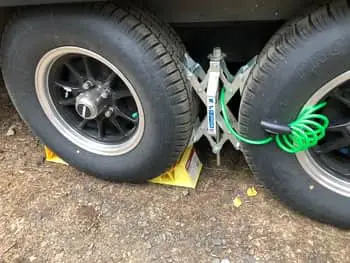
Do You Need to Balance Travel Trailer Tires? Expert Tips and Insights
When planning a trip with your travel trailer, it’s essential to ensure that all components are in good working order, including the tires. Balancing your travel trailer tires is an important aspect of maintaining optimal performance and safety during your travels. This article will discuss the reasons for balancing trailer tires, the potential consequences of neglecting this task, and how to ensure proper balancing.
Travel trailer tires need to be balanced as an unbalanced tire can cause unnecessary vibration, premature wear, and damage to your axle bearings that can lead in failure. An unbalanced tire will cause more heat which can lead to a catastrophic blowout. Most tire dealers have the ability to balance your RV tires.
Balancing travel trailer tires helps to evenly distribute the weight of the trailer, preventing uneven wear, and prolonging tire lifespan. Unbalanced tires can lead to excessive vibration, causing an uncomfortable ride, additional stress on the suspension system, and even accidents. Furthermore, well-balanced tires promote fuel efficiency and a smoother driving experience.
Understanding the importance of balanced tires for your travel trailer is crucial for a safe and enjoyable trip. In the following sections, we will discuss methods for balancing, the signs of unbalanced tires, and when to seek professional assistance. Being proactive in addressing tire balance will contribute to a successful adventure on the road.
You may still be asking yourself if you should balance trailer tires, but let me assure you that you NEED to do this.
Importance of Balancing Travel Trailer Tires
Do you really need to balance your travel trailer tires? The tires on your travel trailer are your lifeline when traveling. The health of your tires is very important, as a blowout could leave you stranded in a remote area.
Tires on vehicles need to be balanced as they are a rotating mass moving at high speeds. A small off balance of weight can change the force that is applied to that one area of the tire causing a tire to vibrate or even bounce at certain speeds. On a travel trailer, this can lead to sway, loss of traction, or the feeling of being uncontrolled.
With a tire bouncing around unbalanced, you may lose traction with the road and cause erratic behavior from your trailer. Also if you lose contact with the road surface, this can enhance sway on your trailer.
Safety and Performance
Properly balancing your travel trailer tires is crucial for ensuring the safety and performance of your RV. Unbalanced tires can cause vibrations, impairing your ability to control the vehicle effectively.
This increases the risk of accidents and can make your journey more challenging. Balanced tires provide better traction on various road conditions and ensure that your wheels are working in unison for a smooth driving experience.
Unbalanced tires can also lead to premature blowouts. Another cause of a blowout can be an unlevel trailer while towing, read about it in our guide here .
Longevity and Fuel Efficiency
Balancing your trailer tires can also contribute to their longevity, as it prevents uneven wear on the tread. When tires are unbalanced, one area of the tire may wear down faster than the rest, leading to a need for earlier replacement. Keeping your tires balanced also improves fuel efficiency, as properly balanced wheels require less energy to rotate.
This means that your travel trailer will consume less fuel, allowing you to save money in the long run.
Comfort and Handling
A smooth ride significantly impacts your comfort when traveling in an RV. When tires are balanced, you will experience fewer vibrations as you drive. This means a more comfortable journey for you and your passengers. Additionally, balanced tires improve handling, making it easier for you to navigate tight turns and maneuver your travel trailer in various situations.
Signs of Unbalanced Tires
Excessive vibrations.
If you experience excessive vibrations while towing your travel trailer, it could be a sign of unbalanced tires. Unbalanced tires can cause noticeable sway and wobble, making it challenging to maintain control of your trailer on the road. Reduced stability can increase the risk of accidents, so it’s vital to address this issue promptly.
Unbalanced tires cause vibration which can rattle rivets, screws, and other items loose on your expensive trailer. Your travel trailer already has enough vibration and earthquake like movement so adding an unbalanced tire can further road damage on the vehicle.
Premature Wear and Tear
Unbalanced tires often lead to uneven wear patterns on your travel trailer tires. This premature wear and tear can result in needing to replace your tires sooner than expected, costing you both time and money. By regularly checking your tires for uneven wear, you can detect unbalanced tires early and take corrective action before the issue escalates.
Damage to Suspension and Components
When your travel trailer tires are unbalanced, it puts additional stress on your trailer’s suspension system and other components. Over time, this extra strain can lead to increased wear and damage to parts such as bearings, axles, and springs.
Keeping your tires properly balanced can help you avoid costly repairs and extend the life of your travel trailer’s components.
Balancing Process and Techniques
Static and dynamic balancing.
To balance your travel trailer tires, you need to understand the differences between static and dynamic balancing. Static balancing ensures the tire remains stationary with no heavy spots when suspended vertically on the axle.
It requires adjusting the tire weight around the center of the bearing to counteract centrifugal force.
Dynamic balancing, on the other hand, involves even distribution of weight around the entire tire circumference. It prevents any side-to-side motion or wobbling while the trailer is in motion, ensuring a smoother ride.
Wheel Weights
Wheel weights are essential tools for achieving proper tire balance. They come in different materials, such as steel, zinc, or lead, and are available in adhesive or clip-on styles. To use wheel weights:
- Identify the heavy spots : Spin the tire and identify the heavy section, which should stop at the bottom.
- Apply the wheel weights : Place the wheel weights opposite the heavy section on the tire’s inner and outer edges, ensuring a uniform distribution of weight.
Professional Tips for Balancing
Here are some professional tips to help you balance your travel trailer tires effectively:
- Check the axle and bearings : Ensure the axle is in good condition and the bearings are properly greased to avoid any balance-related issues.
- Use a tire balancing machine : These machines provide precision and accuracy when measuring tire balance, making it easier to apply the appropriate wheel weights.
- Rotate the tires : Regular tire rotation can help in maintaining even wear, which in turn, keeps balance and handling optimal.
Choosing the Right Trailer Tires
Manufacturer recommendations.
When selecting trailer tires, it’s essential to follow the manufacturer’s recommendations. Trailer tire manufacturers have specific guidelines for size, load capacity, and other properties that ensure the tires support your towing activities. Always check your trailer’s owner’s manual or consult with the manufacturer to confirm the tires meet their standards for safety and performance.
Understanding Tire Ratings and Specifications
In addition to the manufacturer’s recommendations, it’s crucial to understand tire ratings and specifications. These include load capacity, speed rating, and inflation pressure. Load capacity is the maximum weight the tire can support, while speed rating indicates the maximum speed the tire can handle safely. Inflation pressure refers to the appropriate amount of air pressure that should be maintained in the tire for optimal performance.
Consider the following factors when choosing trailer tires:
- Age of the tire : Tires have a lifespan, and it’s generally not recommended to use a tire that’s more than five years old. Look for the “DOT” number on the side of the tire, which provides information on its production date. This will help you avoid purchasing or using aged tires that may not be suitable for safe towing.
- Tire type : Radial or bias-ply tires are commonly used for trailers. Radial tires often provide better heat dissipation and a smoother ride, while bias-ply tires are more durable with stronger sidewalls. Choose the type of tire that meets your specific towing needs and preferences.
- Proper inflation : Maintaining the correct air pressure in your tires is essential to prolong their lifespan and ensure a safe towing experience. Underinflated tires can cause poor handling, reduced fuel efficiency, and increased tire wear. Overinflated tires can cause a harsh ride and uneven tire wear. Always follow the manufacturer’s inflation recommendations.
By following these guidelines and understanding tire ratings and specifications, you can confidently select the right tires for your travel trailer, ensuring safe and enjoyable towing experiences.
Tire Maintenance and Inspection
Regular checks for damage.
Regularly inspect your travel trailer tires for any damages that may have occurred during use. Look for signs of punctures, cracks, or bulges. Excessive heat can cause the rubber to become more susceptible to damage, so pay close attention to your tires after long trips or during hot weather. Examine the tread for uneven wear, which might indicate an issue with your trailer’s alignment.
By promptly addressing these issues, you can prevent a potential tire blowout.
Proper Inflation and Pressure
Maintaining the correct tire pressure is crucial for the lifespan and performance of your travel trailer tires. Over- or under-inflated tires can lead to uneven wear, reduced fuel efficiency, and a greater risk of tire blowout. Check your tire pressure before each trip, using a reliable tire pressure gauge, and adjust the pressure according to the manufacturer’s recommendations. Remember that tire pressure can change due to temperature fluctuations, so make sure to check the pressure when your tires are cool or have not been recently driven.
- Over-inflated tires: May cause a rougher ride, increased wear on the center of the tread, and reduced traction.
- Under-inflated tires: Can lead to increased heat, reduced fuel efficiency, faster tread wear, and a higher risk of blowout.
Monitoring Tire Aging
Even if your tires appear in good condition, it’s essential to monitor their age. Tires degrade naturally over time, and older tires are more prone to blowouts. As a general rule, replace your travel trailer tires every five to seven years, regardless of how they look visually. You can find the tire’s age, indicated by the DOT code on its sidewall. This code reveals the week and year of manufacture, allowing you to determine when it’s time for a replacement. Always check the age of your tires during maintenance and inspections to ensure your travel trailer is safe and roadworthy.
Common Questions
To further assist you, we’ve compiled a list of frequently asked questions and expert answers related to balancing travel trailer tires.
1. How often should I balance my travel trailer tires?
Experts recommend balancing your travel trailer tires every 12,000 to 15,000 miles, or when installing new tires. However, if you experience vibrations or uneven tire wear, it’s essential to get them checked and balanced sooner.
2. Can I balance my travel trailer tires myself?
While it’s possible to balance your tires at home using a portable tire balancer, experts advise seeking professional help for the best results. Tire service centers have specialized equipment and trained technicians who can ensure a precise and accurate balance.
3. Is it necessary to balance all four travel trailer tires at the same time?
Balancing all four tires simultaneously is the best practice. However, if only one tire exhibits signs of uneven wear or vibration issues, you can choose to have it balanced separately. It’s essential to consult with a tire expert to determine the appropriate course of action.
4. What happens if I don’t balance my travel trailer tires?
Neglecting proper tire balancing can result in several issues, such as uneven tire wear, vibrations, poor fuel efficiency, and stress on your vehicle’s suspension components. In the long run, this can lead to costly repairs and decreased tire lifespan.
Remember, whether you are an experienced or first-time travel trailer owner, prioritizing tire balancing is crucial to ensure a safe and comfortable journey.
Travel trailer tires play a crucial role in ensuring a safe and comfortable trip for you and your family. Balancing trailer tires is an essential step in maintaining their longevity and performance . It helps in reducing vibrations, improves fuel efficiency, and ultimately reduces wear and tear on your trailer’s suspension components.
While you might think skipping tire balancing may not cause any significant harm, doing so can jeopardize your safety on the road. Unbalanced tires can lead to accidents due to poor handling, and may also cause uneven and quick wear on your tires.
Regular inspections and routine maintenance are crucial for maintaining your travel trailer tires in optimal condition. By addressing tire issues promptly, you can avoid potential hazards and ensure a smoother, safer journey on your adventures.
Remember that each trailer and tire setup is different; you should always refer to your owner’s manual for specific guidelines on your tire maintenance. When in doubt, don’t hesitate to consult a professional technician to assist you in balancing your trailer tires and addressing any other concerns.
In summary, balancing your travel trailer tires is not a step to be overlooked. By taking the time to ensure your tires are well-balanced, your travels will be safer, more comfortable, and ultimately more enjoyable.
Frequently Asked Questions
Are trailer tires normally balanced.
Yes, trailer tires are generally balanced when you purchase them new. However, over time, the balance can be affected by various factors such as wear and uneven weight distribution. When you notice any symptoms of unbalanced tires or are replacing your tires, it’s a good idea to have them balanced.
Is balancing necessary for single axle trailers?
Balancing is beneficial for single axle trailers , as it can improve the overall performance and increase the lifespan of the tires. Unbalanced single axle trailers can cause uneven tire wear and put additional stress on the trailer’s suspension components.
Should boat trailer tires be balanced?
Yes, boat trailer tires should ideally be balanced. Doing so can help in providing a smoother towing experience and reduces the risk of uneven tire wear, poor handling, and potential damage to the trailer’s components.
How can I tell if my trailer tires are out of balance?
Signs that your trailer tires may be out of balance include uneven tire wear, trailer sway or vibrations at specific speeds, and increased wear on trailer suspension components. If you experience any of these symptoms, consider having your tires inspected and balanced by a professional.
Is tire balancing required for horse trailers?
Balancing tires on a horse trailer is highly recommended. Horse trailers, like any other trailers, can suffer from uneven tire wear and vibrations if the tires are out of balance. Proper tire balancing will ensure a smoother ride, which is ideal for keeping your horses safe and comfortable during transport.
What can happen if I don’t balance my trailer tires?
Not balancing your trailer tires can lead to uneven tire wear, vibrations, poor handling, and increased stress on the trailer’s suspension components. In the long run, unbalanced tires can also decrease the overall lifespan of your tires, resulting in frequent replacements and increased costs.
Do Utility Trailers need to be balanced?
Yes, utility trailers should have their tires balanced for optimal performance. Just like other types of trailers, balancing the tires on a utility trailer can help prevent uneven tire wear, maintain stability, and protect the trailer’s suspension components, ensuring a smooth and safe towing experience.
When tire shopping for your travel trailer, your tire dealer may tell you that trailer tires do not be balanced. This may be true for some lightweight trailers, or utility trailers only used for short amount of times at low speeds, but your travel trailer which runs at high speeds for many miles will be different. Your travel trailer should be keep in the best running shape as possible, which requires its tires to be balanced.
Be the first to be notified about FREE tips, hints, coupon codes, and email-exclusive information. All for FREE!
Related Posts:

Similar Posts
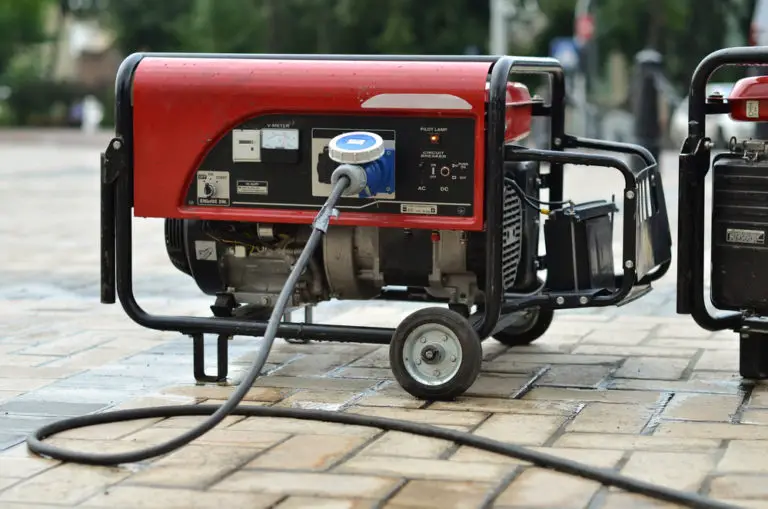
Do Champion Generators Have a Floating Neutral?
The generator industry is one that’s been exploding for the better part of the last several decades. People are more concerned than ever about power outages and having to live life in the dark for any length of time. As a result, many of them are installing either whole-house generators or portable ones, such as…
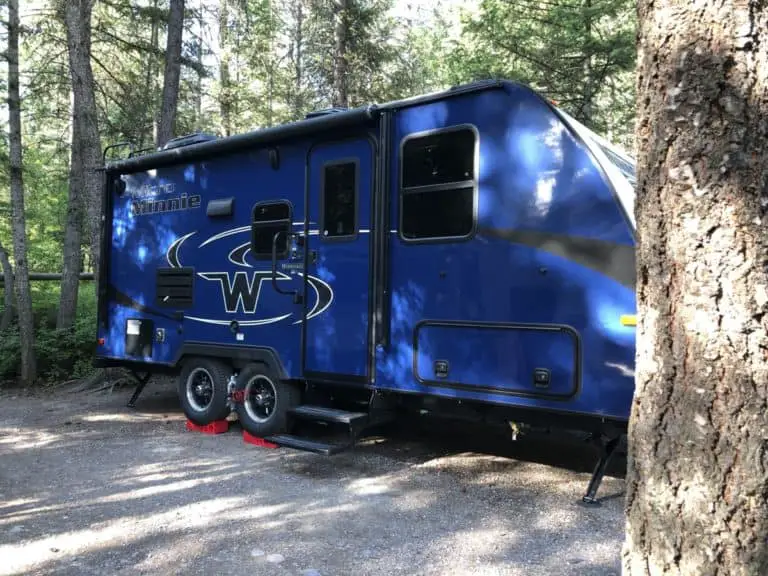
How To Reseal RV Exterior Walls, Windows, and Seams | Plus 4 Tips and Tricks
Whether you’re a new RV owner or have had one for years, resealing your RV’s walls is something that you should be able to do. It’s a necessary part of maintaining a travel trailer, but only a few actually know how. So, how do you reseal your RV exterior walls? To reseal your RV exterior…
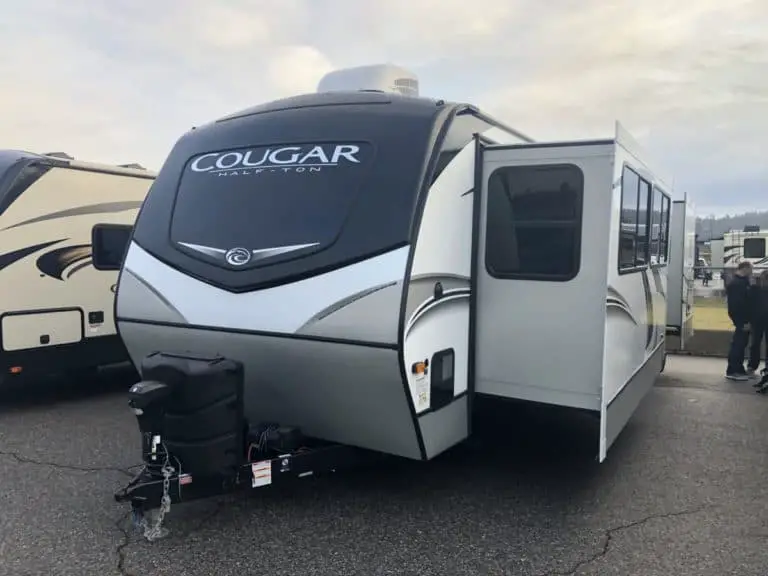
Are Travel Trailer Warranties Transferable?
Owning a travel trailer is a great addition to any family as it can take you on endless adventures that will help you create plenty of memories. No matter what destination you are heading to next, making sure your rig is covered will help you be confident driving down the road without worrying about high…

How to Park a Travel Trailer or RV on a Hill
When traveling or parking your travel trailer for short periods or extended periods of time, you will come across all sorts of terrain. Perhaps your driveway is a steep slope, or storage yard is on a slope, you may wonder if it is safe or if you can park your RV or Travel trailer on…
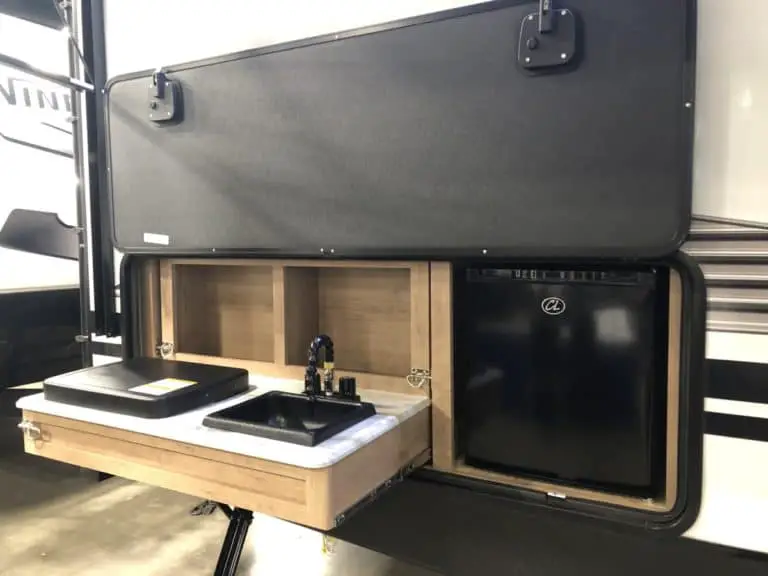
Why Does My RV Water Pump Pulsate When Not in Use and How to Fix It?
When it comes to your RV, there are plenty of inconvenient and annoying things that can happen. From flat tires and power surges to not having proper sway control or weight distribution, RVing is a complicated endeavor. However, one of the more troubling and annoying issues is having a water pump that’s pulsating, even when…
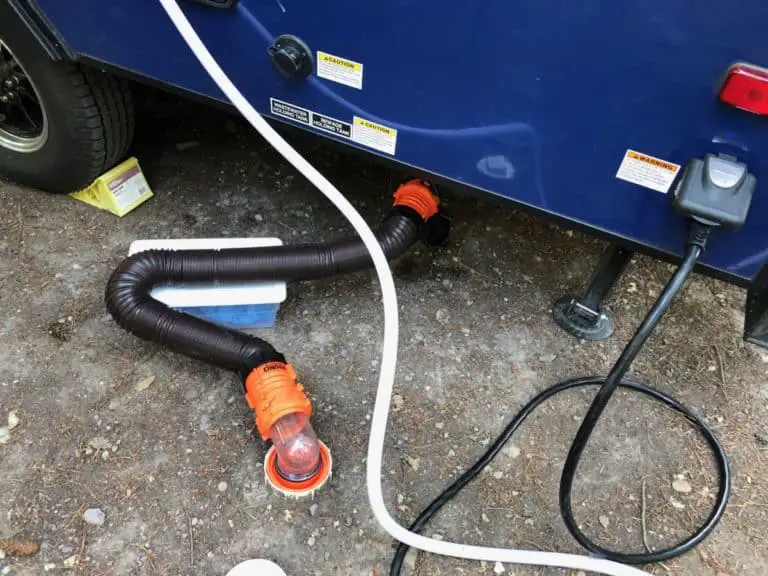
3 Easy Ways to Clean a Black Water Tank
Everything You Need to Know About Your Black Water Tank Travel trailer owners know that this form of camping can bring lots of wonderful experiences and adventures. However, there are parts to owning an RV that can be not so alluring. While it might not be the most glamorous part of owning a trailer, owners…
Join our Newsletter to stay up to date on the latest RV topics and receive our FREE RV Inspection Cheat Sheet Today. Use this tool to inspect new or used campers you are looking at purchasing.
No thanks, I’m not interested!

No products in the cart.

Should You Balance and Rotate Your RV Tires?
NOTE*** The content on this page may contain affiliate links, we may make a commission. And, as an Amazon Associate, we earn from qualifying purchases. More information: disclosure page .
If you’re new to RV living, one of the questions that you may be wondering is how to care for your RV tires. How often should you balance and rotate RV tires?
RV and motorhome tires should be balanced when they are replaced and checked frequently for uneven wear. RV experts generally agree that RV and trailer tires are unlikely to see enough miles to need to be rotated. However, you can rotate them when you see uneven wear or about 8,000 miles.
Some very diligent RVers inspect and rotate their trailer tires at the end of every season. I have replaced a full set of trailer tires a couple of times and it is not a cheap thing to do. So it’s worth trying to extend the life of your RV tires.
However, it continuously varies in different circumstances how to care for your tires. But hold your horses because we will help you answer your questions to prepare you for your next trip!
Before we start, you may want to check these blogs that have more RV driving tips for you:
- Driving an RV in the Snow: The Ultimate Safety Guide
- 15 Expert Tips: How To Drive An RV In High Winds
Should I Get My RV Tires Rotated?
Most experts agree that if you are using your RV for seasonal vacations, that your tires will need to be replaced due to age before needing to be rotated. However, rotating your tires, especially if they are prone to uneven wear, will help the tires last longer .
Tires are crucial elements of your RV’s base, and you need to keep in mind that RV tires are created differently in terms of structure, form, and function.
Many individuals believe that rotating the tires isn’t essential unless there is abnormal deterioration.
On the other hand, rotating tires can assist in minimizing uneven wear over time and extend the life of the tires.
When to Know If My Tires Need Rotation?

Tire rotation isn’t something you need to do every month, especially if you do not travel that much. For example, with seasonal camping, your tires are likely to succumb to age deterioration before they have good consistent use to need a rotation.
But the question is, when will you know if you need to rotate your tires?
You need to keep an eye out for a few indicators that may signal that your RV tires need to be rotated or replaced.
Inspect your tires regularly. To begin with, check for odd wearing patterns over the tires as they might cause dips in your tire tread.
Moreover, feel for feathering by running your hands across the tread’s breadth. If they only flow in one way, it may indicate misalignment, which will need you to rotate the tire to level out the wear.
Rotating your tires when there is not a problem could actually cause damage if done improperly. Seek professional help first if you notice unusual signs so that they can tell whether your tires need rotated or any other services.
How Often Should Your Rotate RV Tires?
Experts recommend rotating RV tires when you see uneven wear or when you reach 6,000 to 9,000 miles. However, most people will need to replace the tires to due age before this. But if you do drive many miles, it helps to extend tire life and better performance while on the road.
Some RVers make it a habit to rotate their tires at the end of every season.
You must, however, follow a specific pattern while rotating the RV tires.
Overall, tire maintenance will help keep your RV comfortable to drive, and reliable throughout its life.
Is It Possible to Personally Rotate My Tires?

RV tire rotations can be done personally and at home. Although you should think about the time and expertise needed to do this. Remember that it will require a lot of effort and patience throughout the process. If it is not done correctly you could cause more problems.
You need to be able to access beneath the RV with your equipment such as an air-powered impact wrench, jack stands, and hand wrenches. You’ll need to jack up your RV to get the weight off the tires and remove them.
If you do not have the time and equipment to do these things, you can always ask for professional services and easier maintenance but expect some costs that will depend on where you brought your RV and what type of tires you have.
Is It Possible for Rotating Tires to Affect Alignment?
There are several topics of discussion when we talk about tire rotation. Many people believe that RV tires should be rotated by the owner once a season, but many also say that they should not be rotated because it might cause further damage.
Both ideas have some validity because improper tire rotation can affect alignment, especially if the RV has had significant suspension difficulties. However, if you are able to properly follow the rotation pattern you shouldn’t be concerned.
If you are still worried, it is best just to bring it to a tire rotation service.
What Happens if I don’t Rotate my RV Tires?
RV tires likely age out before they wear out. Tires that are on an RV won’t generally get enough use before they age.
Many, many RVers never rotate their tires on their motorhome or travel trailer. So likely nothing will happen, if you camp near home and your RV is aligned and driving well.
If you travel long distances you may find wearing patterns in the treads.
Your RV treads may wear out if you don’t rotate them regularly, resulting in a critical incident and unsteady driving condition.
Moreover, tire tread degradation can compromise a driver’s safety on the road and increase accidents which I know you do not want to experience.
How Often Should I Get My RV Tires Balanced?
As a general rule, tires should be balanced when they are replaced on an RV. Theoretically, the tires should remain balanced, but if you notice unusual vibrations or wear, you can have the RV tires balanced as needed.
In an RV, balancing your tires is a significant step because it allows the tires to grip the road during turns and to sustain the vertical load. RV tires are constructed differently than regular automobile tires since they must carry significantly greater weight.
You should be aware that vibrations from the imbalanced tires are a distinct possibility. In some instances, the tires can break or collapse.
Why Should I Get My RV Tires Balanced?
When traveling, maintaining your RV tire’s condition is critical, as a blowout can be very serious. A tiny shift in weight can vary the force given to that one part of the tire at certain speeds, causing it to wobble or feel out of control.
Unbalanced tires have more rubber on one side and metal on the other. The process of balancing a tire aims to add weight on the different sides to compensate for the imbalanced rubber and metal.
Do not worry because this process will not take too much time, especially when done by professionals.
How Can I Balance My Own Tires?
You cannot balance your own tires. Tires must be balanced at the dealers because they have those machines and equipment that are used for balancing tires.
If they do not have it, you can look for it at other tire dealers near you because it is for your safety.
Effects of Unbalanced RV Tires
An imbalanced tire generates extra heat, resulting in a lesser lifespan and perhaps a blowout.
Apart from creating extra heat, it may also produce vibrations that can loosen tire parts and may cause the wheels to have difficulties in spinning. Over a period of time, this will cause problems with your RV.
How Make RV Tires Last Longer
RV tires are expensive and you may have 4 or 6 or more. They are subjected to significant wear and tear and need to be regularly checked and replaced if needed.
When it comes to tire replacement, each tire brand has its own guidelines. Under some circumstances and regular checkups, which evaluate your tire conditions, the average RV tire lifespan is around five years.
To prolong the lifespan of your tires, you should be vigilant to certain things that may cause their early deterioration and blowout. Here is how to make your RV tires last longer
- Do not overload your RV
- Carefully distribute and balance your load
- Ensure the correct tire pressure
- Do not store or park longer than 6 months
- Cover your tires in RV storage
- Inspect your tires regularly for damage or uneven wear
- Check the sidewalls for damage
- Avoid extreme temperatures
- Rotate as necessary
- Replace tires when needed
The tire’s lifespan is still dependent on how much you use them and the maintenance you provide them.
Best Tires for RVs:

Final Thoughts on Balancing and Rotating your RV Tires
To sum it up, your tires do need to be balanced when you replace them. They will ride more smoothly if they are, you don’t need to do it frequently. You do need to rotate them through though.
Another thing to remember is that you can do both of these by yourself, but it can be tricky especially for those who are not familiar. If possible, getting help from professionals to have anything done with your RV is always the best bet.
For more helpful RV Tips, check out these blogs:
- RV Keeps Tripping The Breaker? Here’s What to Do!
- How to Replace an RV Door
- How Long Do RV Rubber Roofs Last? (Plus 7 Maintenance Tips!)
Get this 19-page Travel Planner that I personally use for our family trips
We respect your privacy. Unsubscribe at anytime.

Hi, I’m Shauna – Welcome to Family Travel Fever. We are a large family, that was bitten by the travel bug! I take the kids by myself because I don’t mind flying or driving solo with my crew to discover the coolest places.
Sign up for our email list for my best travel tips plus get the family travel planner free.
Similar Posts

Where to Empty RV Waste Tanks? (cost & instructions)
Learn where to empty your RV waste tanks, how much it will cost and how to empty and flush the black water tank. This is critical information for traveling in an RV.

RV Electric Setup Basics (RV Plugs and Voltages)
Electrical systems may leave your head spinning, but this article explains it simply. Get to know your RV electrical setup basics to understand your RV and to avoid electric problems.

Ever Wonder What Happens to RVs That Don’t Sell?
RVs get manufactured everyday and dealers always have their promos and sales. But have you ever wondered what happens to RVs that don’t sell?

11 Smart Pop-up Camper Gray Water Tank Ideas
So what should you do with the gray water in a pop-up? We show you some pretty smart ideas to handle gray water in a pop-up camper. You can solve your problems by following any one of these pop-up gray water hacks.

How To Set Up an RV For Permanent Location Use
Dreaming of setting up camp for permanent use and living in your RV? We did it and show you how. Don’t miss all the great tips we have to keep you from getting overwhelmed.
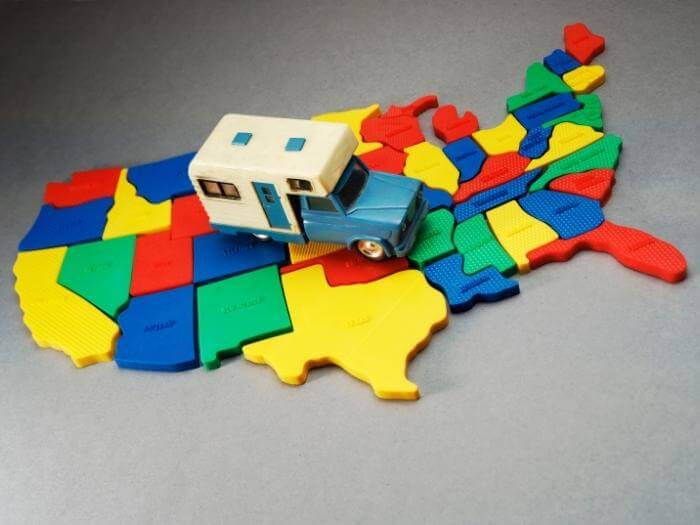
What Driving License Do I Need to Drive an RV in the USA?
Thinking about driving and RV in the US? Make sure you have to correct license to drive and RV and that you are following the rules in each state for driving.
Leave a Reply Cancel reply
Your email address will not be published. Required fields are marked *
This site uses Akismet to reduce spam. Learn how your comment data is processed .

Do Travel Trailer Tires Need to Be Balanced?
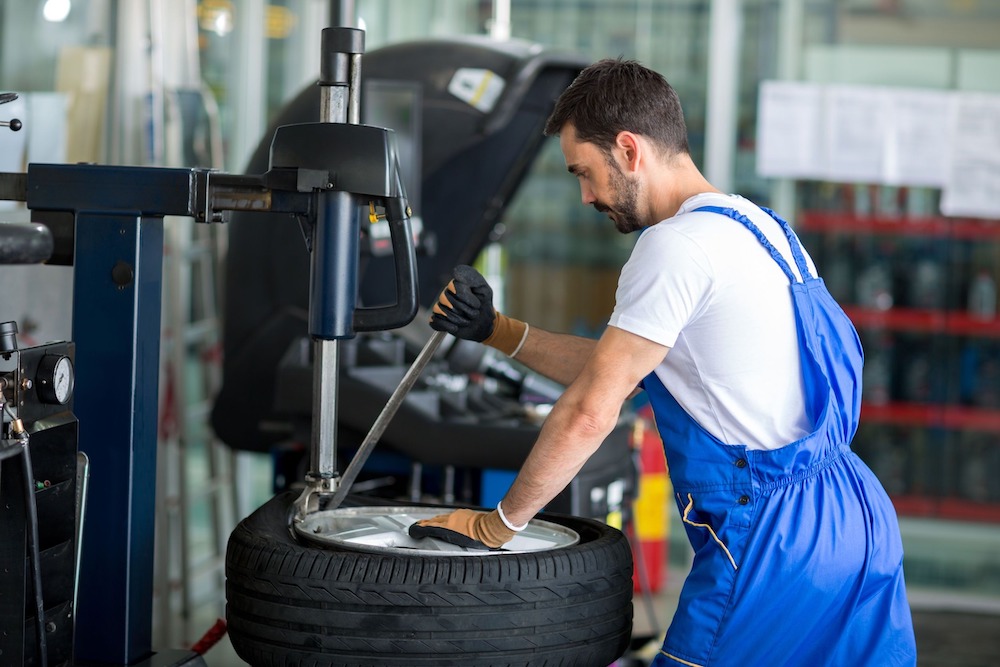
Sharing is caring!
Thanks for your support! If you make a purchase using our links in this article, we may make a commission. And, as an Amazon Associate, I earn from qualifying purchases. See the full disclosure here .
When you first purchase your RV you will have several questions on your mind like Do travel trailer tires and wheels need to be balanced? The answer is yes, you should. Although you may meet RVers and travel trailer owners who disagree, balancing your travel trailer tires is actually necessary for improved performance, tire longevity, and safety factors.
Passenger vehicle tires need to be balanced for ride stability and comfort, as well as for function. Travel trailer tires aren’t balanced to improve the ride for passengers, but they should be properly balanced for a safe towing experience.
Unbalanced travel trailer tires can lead to premature tire and wheel failure, or worse: an accident. As you travel at high rates of speed, an unbalanced tire wobbles which creates an unsafe towing environment.
And to top it off, drivers aren’t likely to feel or notice the wobbling from the cockpit of the tow vehicle. It’s important to have your trailer tires balanced even if you don’t feel like there’s an issue.
In this article we’re taking a closer look at balancing travel trailer tires, answering some FAQ, and more. Let’s get into it.
Should Travel Trailer Tires Be Balanced?
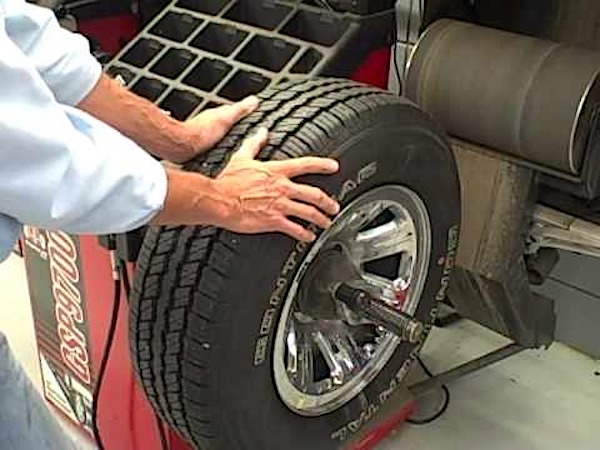
Yes, travel trailer tires should be balanced.
This is a subject that’s really not talked about a lot in the RVing community, nor is it recommended by many people.
And if you ask the vast majority of RV trailer owners if they balance their trailer tires, the answer will probably be “no”.
But we’re here to tell you that: yes, you should have your travel trailer tires balanced.
In an interview done by RV Travel , Wilson Beach, a director with the Tire Industry Association, had this to say:
“Have you ever driven down the freeway and watched a vehicle with an unbalanced tire? The tire can bounce so hard it can actually leave the pavement.”
This bouncing is caused by vibrations and it’s aptly known as “tire hop”.
A balanced travel trailer tire will run smoother, cooler, and increase the overall lifespan of the tire.
Have you ever wondered why some RV travel trailer owners experience blowout after blowout? While blowouts can be caused by many factors, improper tire balance definitely plays a part.
In a passenger vehicle you typically know immediately if your tires need to be balanced. You can feel it in the steering wheel and in the overall ride itself.
However, if you’re pulling an RV trailer, you’re not likely to notice it in your tow vehicle. And RV trailer tires typically don’t come balanced from the manufacturer or dealer, either. Because of these reasons, you need to make sure to have your travel trailer tires balanced yourself.
Do Travel Trailer Wheels Need to Be Balanced?
Just like with your travel trailer tires, you should have the wheels balanced, too.
Improper wheel balance can have a negative impact on your wheel bearings, your axle, and trailer suspension.
Besides the obvious issues of trailer damage and tire blowouts, improper wheel or tire balancing on your travel trailer can damage components inside your trailer, too.
What Are The Consequences of Improperly Balanced Trailer Tires?
There are several potential consequences of improperly balanced trailer tires. Here are few main ones:
- Premature tire wear and tear
- “Tire hop” from excessive vibration
- Wheel bearing failure
- Negative impacts on your trailer axle
- Negative impacts on your trailer suspension
- Damage to components inside your RV
- Trailer tire blowout
As you can see, there are many important reasons to have your trailer tires balanced.
Can I Use Truck Tires on My Trailer?
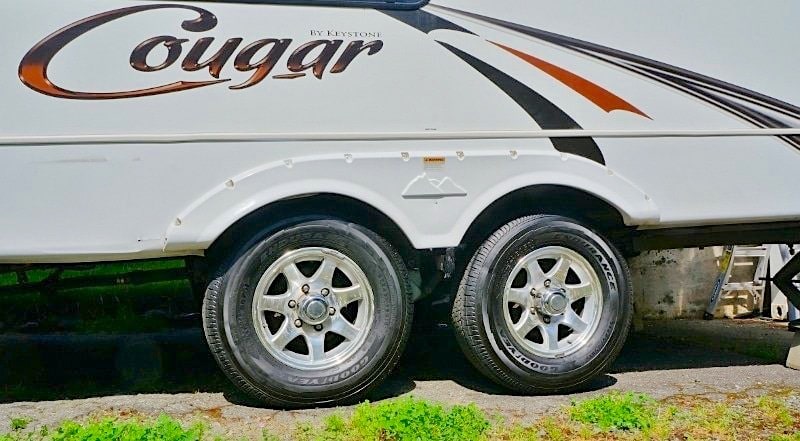
If you are looking to replace the tires on your trailer you will have a few options available to you. You might even think to use truck tires instead of travel trailer tires, but is this a good idea?
Light truck tires are sometimes used in RVs but generally not on utility trailers. Light truck tires are a type of passenger vehicle tire, and as a result, they are not built with a thick sidewall like regular trailer tires. The thicker sidewall helps significantly with the vertical load. So, with that in mind, it is recommended that you use travel trailer tires in most situations.
One of the biggest reasons that a tire can fail is overloading. If you use a truck tire, you are significantly increasing the chances that it will happen. You are towing a lot of weight with your travel trailer and if the tires are not properly rated, they will fail.
Additionally, heat build up can be a significant problem for a lot of people. Thicker tires build up heat when they are not properly inflated. As a result, you need to constantly make sure your tires are inflated correctly when you are pulling a travel trailer. This is why so many RVers use a Tire Pressure Monitoring System like the one we use on our RV.
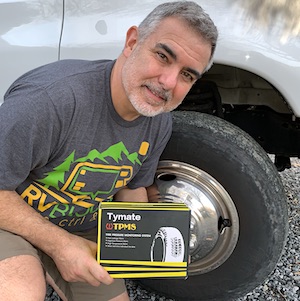
How Long Do Travel Trailer Tires Last?
Age is a major factor when you are determining whether you need to replace your tires. Unfortunately, travel trailer tires undergo a lot more wear and tear than regular passenger vehicle tires. As a result, they need to be replaced more frequently.
Each tire manufacturer will have different recommendations on when to replace their tires. However, the average life span of a trailer tire is around five years under normal maintenance and conditions. That being said, you should start to consider tire replacement after three years. At this time you should consult with an expert and see how your tires are faring.
To increase the lifespan of your tires you can keep an eye out for things that cause tire damage and try to avoid them. Tire damage is often caused by improper tire pressure, excessive exposure to sunlight, improper loading, exposure to high temperatures, improper tire balance, and axle alignment issues. If you can avoid exposing them to these issues, then you can maximize your tire’s life span.
How Often Should You Replace Travel Trailer Tires?
Industry experts recommend replacing your travel trailer tires between three to six years of age.
If you’re unsure how to tell how old your travel trailer tires are, you can find out the age by reading the tire date code printed on the sidewall.
Pro tip: learning how to read tire dates can help you negotiate price when buying a used RV or travel trailer with old tires, even if they look new.
If the travel trailer has been left sitting in the sun for extended periods of time, aim for replacing them every three years or so. Otherwise, the general consensus is about every five years.
Why Do Travel Trailer Tires Blow Out?
As we have mentioned several times already, heat build up can cause a myriad of issues for travel trailer tires. As a result, it should come as no surprise to hear that heat build up is the biggest cause of tire blowouts.
There are many reasons that your tires might get overheated, but the two most common reasons are overloading of the trailer and having underinflated tires.
You should be able to check the trailer axle capacity on a sticker or plate on the frame of your trailer. You should not load your trailer beyond its capacity in any scenario. Additionally, you should make sure that your tires are always inflated to no more than 90%the maximum psi indicated on the tire when the tires are cold.
How Do I Identify Trailer Tires?
When you are looking for travel trailer tires you want to look for an ST or LT rating. ST stands for Special Tire, and LT stands for Light Truck. When you see a tire it should have a label and it will say something like ST 205/75 D14. ST of course stands for special tire, but what does everything else mean?
The 205 refers to the width of the tire in millimeters. Then the 75 refers to the ratio of height to width. In this example, the tire’s height is 75 percent of its width. The smaller the aspect ratio, the wider the tire in relation to height. Finally, the D indicates a bias ply tire and stands for diagonal. If there is an R there instead of a D, it means that it is a radial tire. The number following the letter is the diameter in inches. In this case, the tire is 14 inches in diameter.
Should I Use Radial Tires on My Camper Trailer?
One of the biggest decisions you need to make for your travel trailer is which type of tires to use. Your two main choices are bias and radial tires. Generally, bias tires are less expensive, but they do not perform as well. Trailer owners often say that these tires are flowers because they follow behind the vehicle that pulls them. The vehicle up front does all the work, while the tires just keep the trailer moving.
Conversely, radial tires perform much better. With radial tires your ride will be smoother, the trailer will not bounce as much, and they have a longer shelf life. However, the most important characteristic of these tires is that they can carry a heavy load.
So, should you use radial tires? If money is not a factor then radial tires are certainly the better option. However, finances obviously affect the decision making of most people. As a result, you may need to go with bias tires if you think radial tires are too expensive.
What Are the Best Travel Trailer Tire Brands to Buy?
Here we will look at five of the best travel trailer tire brands available to you. There are so many sellers on the market that is important to narrow things down. Otherwise, you will have a long and grueling search for the best option. However, by looking at these five brands you should be able to find your perfect tires much quicker.
1. Trailer King
Trailer King is one of the best options for people that are looking for new travel trailer tires. Their tries are manufactured to provide a high standard of safety, reliability, and comfort. They deliver everything you might need from an expansive ST Radial size lineup while providing incredible value. Here you should be able to find something that fits any type of trailer.
2. Task Master
Since 2003 Task Master has been making tires for light trucks, trailers, and other towable vehicles. They deliver products that deliver exceptional performance while operating under demanding conditions. Task Master is most known for its travel trailer tires. These products feature a double polyester cord body, double steel belts or full steel sidewalls, and nylon overlays that add extra endurance in tough loading conditions. Additionally, these tires are incredibly strong, making them a great choice for drivers that will be driving off road and in rough conditions.
3. Cooper Roadmaster
Another great brand available to you is Cooper Roadmaster . They sell a variety of tires for many types of vehicles and trailers. The travel trailer tires they sell feature a premium, high scrub tread compound that provides improved treadwear and long lasting protection against cutting and chipping.
Additionally, they have stone ejector ribs in the grooves that help preserve the casing for retreading. Finally, the rounded shoulder design helps minimize the effect of high lateral forces on the tire.
4. Deestone
The final brand we will be looking at is Deestone . They have nine tires available for sale that are designed for trailers. Each of these options is built to reduce rolling resistance. Additionally, you will not need to worry about heat built up with these options. As a result, these tires last longer than many other options available to you.
Prepare for Your Next Trip by Finding the Best Travel Trailer Tires for You
Do travel trailer tires need to be balanced? After reading this article, you should know that our answer is an unequivocal “yes”. In addition to having properly balanced trailer tires, you should also have tires that are capable of handling the load of your travel trailer.
It is generally not a good idea to use truck tires on your trailer as they are not strong enough to handle the weight of a large trailer. As a result, you will want to look for tires that either has an ST or LT rating. These ratings indicate that they can handle at least some trailers.
If you use regular tires you will be at a higher risk of overheating. When this happens your tires might blow out which is the last thing you want to happen. Not only can it be expensive to replace your tires, but if it happens while you are driving it is incredibly dangerous.
Finding the best travel trailer tires for you can be challenging. After all, there are dozens of brands out there, and each of them has several options to choose from. As a result, you should start your search by narrowing the field down to a few brands. Some of the best manufacturers available to you include Trailer King, Task Master, Cooper Roadmaster, Yokohama, and Deestone.
What type of tires are you most interested in purchasing? Have you ever had issues with your travel trailer tires in the past? Where do you plan on going on your next trip? Let us know in the comments!
Related Reading About Travel Trailers
Rv and travel trailer bubble level installation guide, how long does a travel trailer last, do i need towing mirrors for a travel trailer, should i grease my trailer hitch ball or not, 5 best generator mounts for a travel trailer, protecting your travels with rv warranties: what, how, and why.

2 thoughts on “Do Travel Trailer Tires Need to Be Balanced?”
Balanced tires are easier on wheel bearings. I always have mine balanced.
Thanks, Mike for all this important info about RV tires. My wife and I have been taking a trip or two for the past 6 years in our travel trailer, but now we’re selling it and stepping up to a 40′ fifth wheel, selling, giving, and donating most of our belongings, and going full-time RVing! I’m sure the tire info that you’ve provided will prove invaluable to us. Lord bless you and your wife and keep up the good work!
Leave a Comment Cancel reply
Save my name, email, and website in this browser for the next time I comment.
Everything RV and camping!
How Often Should You Rotate RV Tires?

Sharing is caring!
Thanks for your support! If you make a purchase using our links in this article, we may make a commission. And, as an Amazon Associate, I earn from qualifying purchases. See the full disclosure here .
There’s only one part of your RV that should be touching the highway when you travel: the tires. Any veteran RVer will be the first to tell you that you should rotate your RV tires regularly.
More than anything else, it’s a matter of safety, especially if you spend a lot of time traveling across the country in your RV. Every time you rotate your RV tires, you enhance the safety, fuel efficiency, and durability of the tires and your suspension system.
Should You Rotate Your RV Tires Regularly?
Every aspect of RV maintenance requires a degree of regularity, and your RV tires are no exception. You should rotate your RV tires regularly and establish an inspection routine every few months. Doing a quick visual inspection before and after each trip is also a good idea.
There’s no telling what your tires might pick up between point A and point B, not to mention the alignment issues that crop up from time to time. If you hit a hard bump, that’s enough to knock the alignment off.
How Often Should You Rotate Your RV Tires?
You should rotate your RV tires according to manufacturer recommendations, which is usually every 3,000 to 8,000 miles. Sure, that sounds a bit excessive, especially compared to passenger vehicles. But we can all agree that an RV is a different animal than a family SUV or a pickup truck.
Whether you’re in a motorhome or pulling a travel trailer, the immense weight and the intense pressures created from inertia place the RV in a different category.
What Happens If You Don’t Rotate Your RV Tires?
There’s no way of saying something will happen if you don’t rotate your RV tires. The point is the odds of something bad happening increase dramatically the longer you go without rotating them.
- Uneven wear
- Tire blowout
- Poor handling in inclement weather
- Increased replacement costs
- Misalignment issues
- Tire tread degradation
Some will argue that rotating your tires endangers the RV by creating misalignment issues. The argument has some validity, but we’ll cover that in more detail below. As for the rest, these are real issues that crop up when you go a long time without a tire rotation.
How Much Does it Cost to Rotate RV Tires?
Tire rotation is a maintenance routine that should take place more often than a tire change. An RV tire rotation costs anywhere between $100 and $300, depending on your class of rig. In some cases, a tire balance is included, and in some, you’ll need to pay extra.
Can You Rotate Your RV Tires On Your Own?
You certainly can rotate your RV tires on your own as long as you have the equipment, the know-how, and the energy to do it. Due to their weight, you may need an air-powered impact drill, an air compressor, and some hydraulic, heavy-duty jacks and jack stands for Class A and Class C motorhomes.
These aren’t car tires. Unless you’re looking at a small camper or travel trailer, you might not get those lugnuts off with a crossbar. Also, RV mechanics don’t play around when they tighten those lugs down. Plus, you have to be precise. If you don’t know what you’re doing, there’s the potential for damage or misalignment.
Is it Okay to Rotate Your Tires Every 10,000 Miles?
It’s not okay to rotate your RV tires every 10,000 miles unless specified by your manufacturer. Waiting too long may violate the warranty on the tires. That’s why it’s so important to pay attention to manufacturer recommendations.
Some RV tire manufacturers of diesel motorhomes recommend 10,000 miles, but many recommend much sooner for other RV classes.
If you fail to rotate your tires on time and one side wears down more than another, that’s an obvious and noticeable fault when you take it in for repair. RV tires are not cheap, so you don’t want to lose that warranty coverage because you didn’t feel like rotating them promptly.
Can You Rotate Your Tires Too Often?
You can rotate your tires too often. The point of a tire rotation is to maintain an even wear across the tread surface of your RV tires. If you rotate too soon or out of sync, you’ll create uneven wear across the contact surfaces of each tire.
Where Can You Have Your RV Tires Rotated?
Regular mechanics shops are out of the equation when it comes to motorhomes and travel trailers. In most cases, the RV dealership you purchased it from will do the work. Some dealerships also contract third-party repair and maintenance shops as well.
Do You Have to Balance Your Tires Every Time You Rotate Them?
The two words “balance and rotation” are nearly synonymous. It’s rare to hear one without the other. You don’t have to balance the tires every time you rotate them.
However, getting them both done is always a good idea. If it’s a DIY rotation, you can only balance them with the proper equipment anyway.
How Often Do I Need to Rotate My RV Tires if I Don’t Drive Much?
Your RV tires degrade as it sits in a garage, storage unit, or driveway. Fortunately, tire rotation has little to do with that, and you don’t have to rotate them as often if you aren’t going anywhere.
On the flip side, your tires may not be rolling, but maintenance on them is more important than ever. Keep them covered, inflated to the proper PSI, and cleaned while your RV sits. It will make a huge difference in longevity and durability.
How Often Should Motorhome Tires Be Rotated?
The 6,000 to 8,000-mile rule still applies. However, the odds of rotating your motorhome tires before changing them are slim. You may not ever rotate your motorhome tires simply because you’re getting new ones every time a rotation mileage comes around.
There are two reasons this may occur. The first is the typical weight and inertial forces applied to a motorhome are often far higher than a travel trailer.
The second is the difference in the tires. A motorhome has active tires versus the reactive tires of a travel trailer. One is pulled, and the other is driven.
How Often Should You Rotate Your Travel Trailer’s Tires?
The same rule applies to travel trailers, at least in general. A huge, fifth-wheel travel trailer with a 20,000 GVWR is different than a two-person teardrop. You should stick with the manufacturer’s recommendation, which will probably be 3,000, 6,000, or possibly 8,000 miles.
Do All of My RV Tires Need Rotating?
Yes, all of your RV tires need to be rotated. You should follow the same direction for each axle every time. Every tire rotation should be a mirror image of the last tire rotation.
If all of the tires are rotated in a counterclockwise direction the first time, that’s how they should be rotated for the rest of the RV’s life span.
You should never selectively rotate some tires while leaving others in place for another time. Since the entire point is to even out the wear and tear, leaving some tires out of the rotation process will throw everything out of balance.

Can Rotating Tires Affect Alignment?
We mentioned how rotating tires can affect the alignment above for a good reason. Rotating tires, especially if you do it yourself, has the potential to affect the alignment. There’s a wrong and right way of doing this. If you rotate the tires the right way, the RV’s alignment will never be an issue.
Complex suspension systems or suspension systems that need some maintenance can play a role in a misalignment resulting from a tire rotation. If you’re worried you can’t do it yourself, don’t hesitate to take your RV to a professional and get it done the right way.
Why Should I Get My RV Tires Balanced?
Getting your RV’s tires balanced improves the RV’s stability, comfort, and overall safety. There’s no reason you shouldn’t get the tires balanced. The best time to get it done is when it’s due for a tire rotation.
It’s especially true for travel trailers since the driver of the towing vehicle may not feel a slightly imbalanced tire as it wobbles down the road.
Can I Balance My Own Tires?
You can balance your own tires only if you have the right equipment. There’s a way to DIY it, but it’s not recommended because it’s an old-school method known as “static balancing” with a bubble balancer.
- You’ll need an unmoveable tire balancing post (difficult to find)
- Remove the tire
- Remove the weights on the tire
- Clean all dirt and debris from the tire and wheel
- Place the tire on the post and allow it to settle
- Check your leveling bubble on the post
- Add weights to the inside or outside of the rim
- Check leveling bubble
- Rinse and repeat until its level
8 Other Essential Tire Maintenance Tips
1. make sure tires are properly inflated.
Monitor your PSI in each tire religiously. Proper inflation and manufacturer-recommended PIS will improve tread life, performance, fuel efficiency, and longevity of the tire. Consider putting nitrogen in your tires since doing so has some longevity benefits.
2. Watch Your Tire Tread
Use the penny method or a tire tread depth gauge to keep track of the tire tread depth. Your tires should have more than 2/32 of an inch tread depth. If you can see the top of Lincoln’s head/hair, it’s time to get a new tire.
3. Check for Lodged Objects
One of the easiest maintenance routines you can do is a simple visual check of your tires every time you stop. It’s common enough to pick up nails, roof tacks, and worse . This is especially if you pull over on the shoulder, pass through a median, or go off-road.
4. Invest in a TPMS
Most new travel trailers and motorhomes have a TPMS (Tire Pressure Management System). If yours doesn’t have one, many affordable options are available, and they’re easy to install. We use the Tire Minder TPMS ourselves because we think they are the best brand on the market.
5. Look for Sidewall Cracks and Bulges
RV tires are designed with stiffer and thicker sidewalls, but that doesn’t mean they are impervious. Look for hairline cracks along the sidewall or places in the sidewall that bulge out abnormally.
6. Load Your RV Evenly
Weight distribution is crucial. The insane forces working on a travel trailer or motorhome, coupled with the immense weight of the RV itself, are a recipe for damage if you don’t balance out your weight distribution.
7. Don’t Store Your Rig Longer Than 6 Months
You might be surprised to learn that long-term RV storage strains the tires as much as driving on them, sometimes more. Many RVers store their RVs throughout the winter, but you should never do so for 6 months or longer.
8. Replace Tires When Needed
If you have a good routine and practice regular tire maintenance, you’ll know when your tires are ready for a change. Once that time comes, don’t hesitate to get it done or try to wait it out for after the next trip.
So, How Often Should You Rotate Your RV Tires?
There are a lot of different tire brands out there, but every one of them comes with manufacturer recommendations. You should follow those recommendations without fail, if at all possible.
If the tires look great, the consensus is between 6,000 and 8,000 miles. You’re taking a risk out there on the highway if you go beyond 8,000 miles, especially if there is visible wear and tear on the tires.
Outside of that, establish a good inspection routine, keep the PSI within recommended levels, keep the tires clean, and periodically check the tread. The tires are one of the most important maintenance items on an RV. You take care of them, and they’ll take care of you.
Related Reading:
1. do travel trailer tires need to be balanced, 2. how to prevent rv tires from dry rotting, 3. 115 point rv inspection checklist (new or used), 4. how to check for rv and travel trailer recalls, about the author:.
Thomas Godwin is a full-time freelance writer with a BFA in Creative Writing, a U.S. Marine, and an avid outdoorsman.
When he’s not writing, he’s raising chickens and Appleyard ducks. Thomas also constructs teardrop campers (attempting to anyway) and kayaks the Blackwater River with his wife, two daughters, and his Dobermans.
Source: https://rvblogger.com/blog/how-often-should-you-rotate-rv-tires/
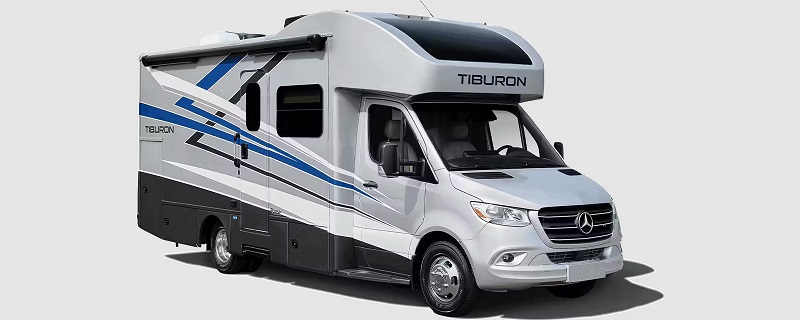
5 Best Small Motorhomes With Slide Outs For 2024

Camping Dysfunction: Symptoms, Causes, and Treatment
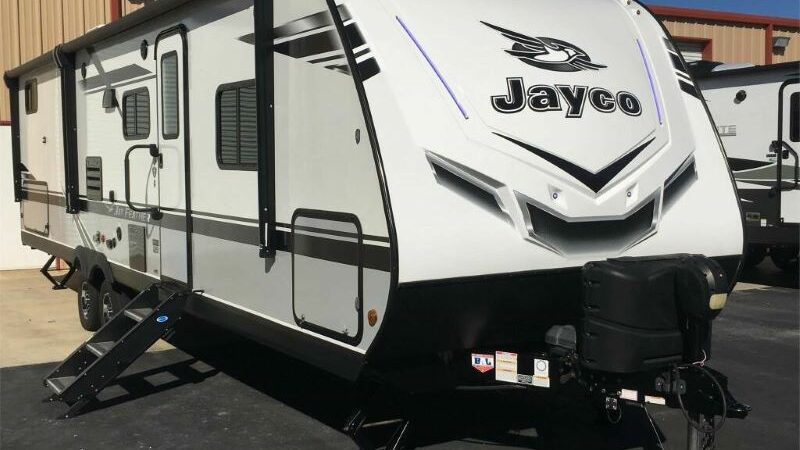
10 Best Used Travel Trailers With 2 Bedrooms
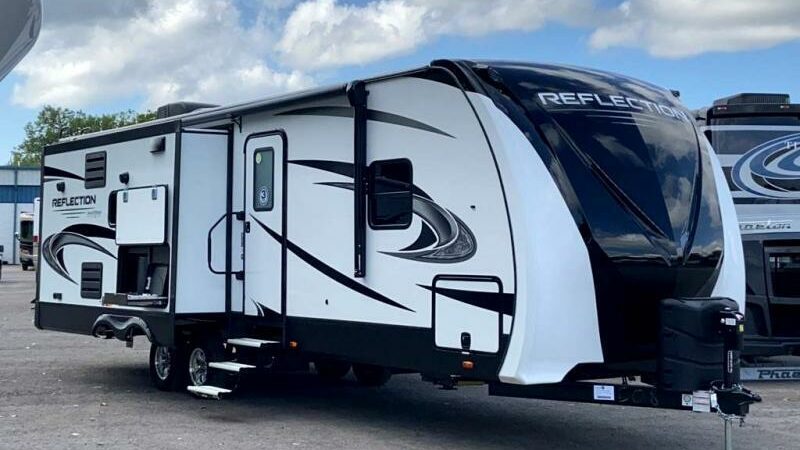
10 Best Used Travel Trailers With Outdoor Kitchens
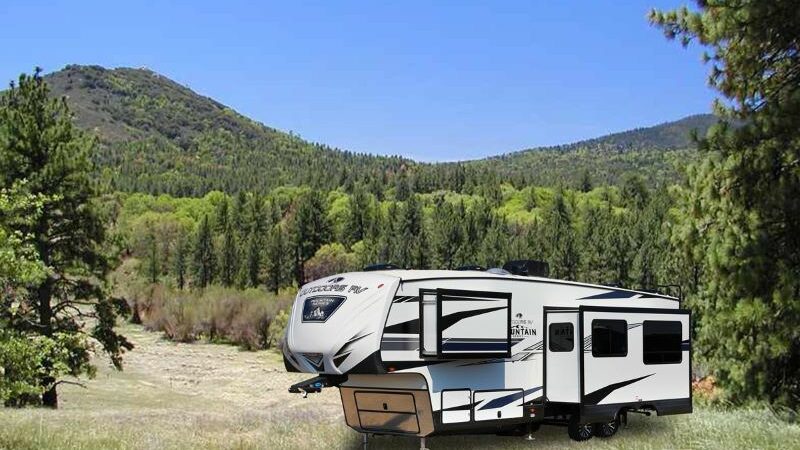
8 Best Used 4 Season 5th Wheels
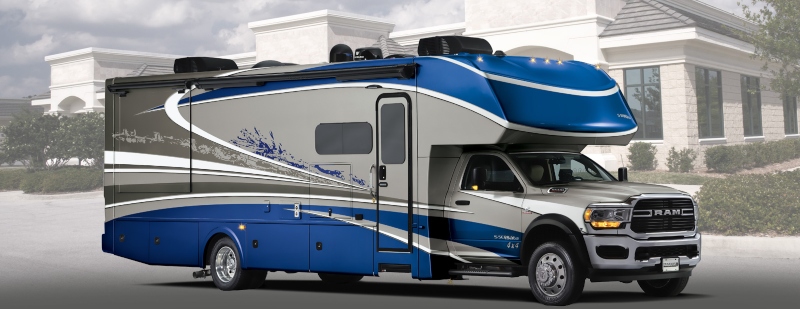
7 Best Used Class C RV Brands

Join Now Login
Back to the Learning Center >
Tire Care Essentials: How Often Should You Rotate Your RV Tires?
Introduction
RV travel is all about the open road, exploration, and adventure. To ensure your journeys are safe and enjoyable, proper tire maintenance is crucial. One aspect of tire care that often comes up is tire rotation. Just like with regular vehicles, RV tires need to be rotated to maintain even wear and extend their lifespan. In this article, we’ll discuss how often you should rotate your RV tires and why this maintenance task is essential for a smooth and safe travel experience.
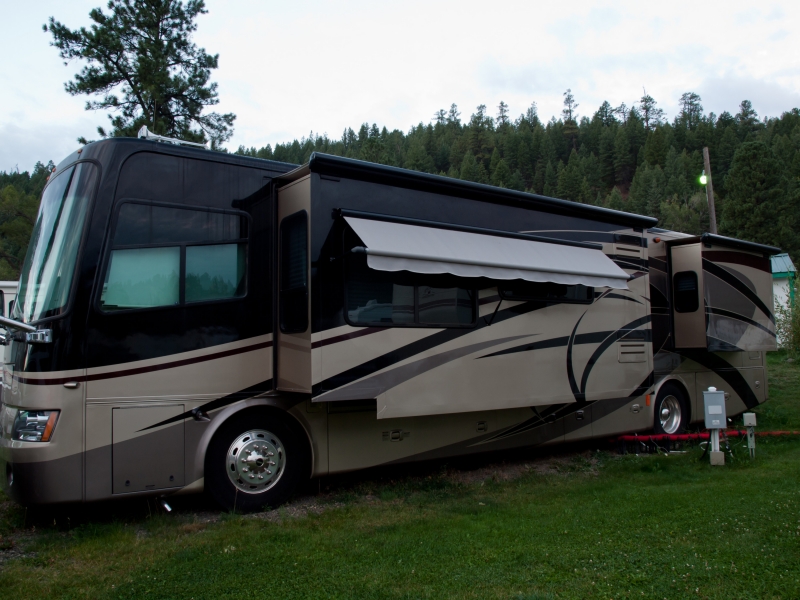
The Importance of Tire Rotation for RVs
Tire rotation involves moving your RV’s tires from one position to another on the vehicle. The purpose of rotation is to ensure that tires wear evenly, which helps in several ways:
- Even Tread Wear : Rotating tires helps prevent uneven tread wear. When tires wear uniformly, you’re less likely to experience issues like vibrations or loss of traction.
- Extended Tire Lifespan : Even wear across all tires can extend their overall lifespan. This means fewer replacements and cost savings in the long run.
- Improved Handling and Safety : Properly rotated tires contribute to better handling and safer driving, especially in challenging road conditions.
How Often Should You Rotate RV Tires?
The ideal frequency for rotating RV tires can vary depending on several factors, including the type of RV, the type of tires, and your travel habits. However, a general guideline is to rotate your RV tires every 6,000 to 8,000 miles. Here are some considerations:
- Manufacturer’s Recommendations : Always refer to the tire manufacturer’s recommendations for specific guidance on tire rotation intervals. They may have specific recommendations for your RV tire model.
- RV Type : The type of RV you have can influence the wear patterns of your tires. For example, if you have a motorhome, the front tires tend to wear faster due to steering and braking. You might need to rotate them more frequently than the rear tires.
- Travel Habits : If you frequently embark on long journeys or use your RV for full-time living, you may need to rotate the tires more often. Conversely, occasional RV users may rotate less frequently.
- Tire Type : The type of tires on your RV matters. Radial tires tend to wear more evenly than bias-ply tires, so the rotation interval might differ.
DIY or Professional Rotation?
RV tire rotation can be a task that some RV owners prefer to do themselves, while others opt for professional service. Here are some points to consider:
- DIY : If you’re comfortable with the process and have the necessary tools, you can rotate your RV tires yourself. Make sure to follow the recommended rotation pattern for your specific RV and tire type.
- Professional Service : If you’re unsure about the process or prefer to leave it to experts, many RV service centers offer tire rotation services. This option ensures the job is done correctly and that any potential issues are identified during the process.
Tire rotation is a critical aspect of RV tire maintenance. By ensuring that your RV’s tires wear evenly, you contribute to a safer, smoother, and more cost-effective travel experience. The frequency of rotation depends on several factors, including your RV type, tire type, and travel habits. Staying within the recommended range of 6,000 to 8,000 miles for rotation is a good practice. Whether you choose to rotate your RV tires yourself or seek professional service, the key is to keep your tires in excellent condition to make the most of your RV adventures.
Leave a Reply Cancel reply
You must be logged in to post a comment.
Forest River Ibex RVS1
Coachmen northern spirit 2963bh, coachmen northern spirit 2557rb, forest river ibex 19rbm.

Established in 2012 Campground Views is built by campers for campers
More links and information
Ⓒ 2019 - all rights are reserved.
Username or Email Address
Remember Me
Lost your password?
Create Free Account
>> Members login
Login to Your Account
Create an Account Here

- Find a Location
Everything You Need to Know About RV Tires and Trailer Tires

Because most motorized and towable RVs are driven less than passenger vehicles, their tires tend to last between three and six years on average. The more you drive, the more frequently you’ll need to replace your tires.
The tread wear is the metric to monitor over your tires’ lifespan. When that tread falls below a depth of 4/32”, it’s time to replace your RV tires. But even if your tires have plenty of tread left, keeping them for more than 8-10 years is not recommended.
Most RV and travel trailer tires should be replaced every 10,000 to 15,000 miles. But each manufacturer recommends a service life for their tires, so it’s best to seek their advice on tire replacement intervals.
RV tire covers can protect your tires from UV exposure, dry rot, and other wear and tear that can shorten your tire’s lifespan. Even if you aren’t driving your recreational vehicle a lot, leaving your tires exposed to the elements will decrease their serviceable life.
How to Change an RV Tire

Blowouts happen, so if you find yourself needing to swap a blown RV tire for a spare, you’ll need the following tools:
- Your RV may or may not have one. They are less common on Class A RVs due to the weight of the vehicle and the dangers of changing a tire on the side of the road.
- If you don’t, call Good Sam Roadside Assistance to get you back on the road.
- DO NOT USE your RV’s built-in hydraulic or stabilizing jacks to lift your RV.
- A lug wrench or torque wrench
- Impact driver with the correct size socket for wheel lugs
- Wheel chocks
- Tire inflator or air compressor with the appropriate fittings
With those tools in hand and your RV parked in a safe location, follow these steps:
- Retrieve your spare tire.
- Place wheel chocks in front and back of tires you aren’t changing to keep your RV from moving.
- Use your lug wrench to loosen all lug nuts holding the tire in place.
- Place the bottle jack under your RV’s frame.
- Extend the bottle jack until the tire is completely off the ground. I f the tire is blown, you need to extend it high enough for the inflated spare tire.
- Use your impact driver and socket to remove wheel lugs.
- Remove the blown tire and set it aside.
- Center the spare tire on the lug threads.
- Replace wheel lugs by hand (at least get them started by hand to avoid cross-threading).
- Initially tighten lug nuts with the impact driver.
- Retract the bottle jack to lower the tire onto the ground.
- Tighten lug nuts entirely with your torque wrench. All manufacturers recommend lug nuts be tightened to a specific torque setting.
- Use your tire gauge to check the pressure in your spare tire.
- If necessary, inflate your tire to the recommended PSI.
- Remove wheel chocks.
- Store the blown tire safely until you find a tire or service center to acquire a new spare.
- Store all your tire-changing tools.
Driving your RV without a spare in tow isn’t recommended. If you’ve had to install a spare, you should replace the original tire as soon as possible before continuing on your RV road trip.
How to Change a Trailer Tire

This process is largely the same for travel trailers . But there are a few additional pointers to remember. Follow the same steps as above, with these safety tips in mind:
- Ensure your trailer’s stability. Even if your trailer is hitched to your tow vehicle, you should place wheel chocks in front and back of the tire(s) you aren’t changing to prevent the trailer from shifting and potentially falling off your bottle jack. You may consider extending your trailer’s stabilizing jacks once your bottle jack is extended. This provides a backup to keep your trailer elevated if the bottle jack fails or slips out of place.
- Inspect the wheel hub after removing the old tire. This should be done for RV and trailer tires. Visually inspect the hub for cracking, buckling, or other signs of damage. If you notice any major signs of damage, contact roadside assistance before moving your RV.
- Find a replacement spare. Don’t travel far without a spare tire for your travel trailer or fifth wheel . Tires for smaller trailers can be harder to come by, but contacting your nearest Camping World Service Center is a good place to start when looking for the best trailer tire providers in your area.
How Much Are RV Tires?

Tire prices fluctuate depending on size, brand, weight capacity, and quality. But the average RV tire costs somewhere between $250 and $300.
Tires for Class A RVs tend to be more expensive than car tires or tires for Class C RVs because they are larger and heavier. Owners of Class B RVs will usually pay less per tire because they require smaller and lighter tires, but your cost may be higher if you decide to invest in higher-quality tires made for off-roading.
How Much Are Trailer Tires?
Most travel trailer tires are smaller than tires for motorized RVs. Their average cost is likely to fall between $100 and $200. But, of course, that cost can fluctuate depending on the exact brand, tire size, load range, tread pattern, and construction you’re looking for.
How to Identify RV and Trailer Tires

Trailer tires are usually identified by an ST or LT rating. ST stands for ‘special trailer tire,’ and LT stands for ‘light truck’ tires These ratings will be at the start of the tire’s label, such as ST 205/75 D14. Here’s a quick breakdown of the rest of that label:
- 205 denotes the tire width measured in millimeters.
- 75 states the tire’s height-to-width ratio (i.e. height = 75% of width in this case).
- D stands for ‘diagonal’ but also denotes a bias ply tire (R would denote a radial tire).
- 14 tells you the tire’s diameter in inches.
Radial or Bias Ply Tires?

Many RV owners don’t know they have options regarding the types of tires for their RV or travel trailer . Radial tires are more common, but bias ply tires are a reasonable alternative for certain uses. Here are some quick definitions:
- Radial tires are built with steel belts inside the tire running at a 90-degree angle to the tread center line.
- Bias ply tires are constructed with nylon belts running at a 30 to 45 degree angle to the tread center line.
The general consensus is that radial tires provide a smoother ride, less trailer bounce and sway, longer tread life, wider footprint, tougher overall construction, and the ability to run cooler.
Bias ply tires are generally less expensive and offer stronger sidewall construction. They also have the advantage when it comes to carrying heavy loads, as they offer a uniform number of plies to support weight in both the tire’s tread and sidewall.
The best tire type for your trailer is indicated on your trailer’s information label (D = bias ply, R = radial). Generally, radial tires are recommended for trailers used regularly for longer trips. Bias ply tires are recommended for tandem axle trailers used for shorter, less frequent trips.
What PSI Should My RV Tires Be?

RV tires have their maximum pressure stated on the tire’s sidewall. This maximum pressure should never be exceeded. That said, the RV manufacturer will usually state the recommended tire pressure for your RV, not necessarily the tire manufacturer.
The RV manufacturer’s recommended tire pressure rating can be found on your vehicle information label or in your owner’s manual. But it’s important to recognize that this pressure rating is for cold tires (i.e., when your RV or travel trailer has been parked for at least three hours).
Should Trailer Tires Be Inflated to Max PSI?

The dangers of over-inflating trailer tires include more difficulty braking and a higher likelihood of tire blowouts. Over-inflated tires also wear out quicker, don’t provide as much traction on wet roads, and can alter your fuel efficiency.
To avoid over-inflating, fill your tires to their recommended pressure when they are cold. As the air temperature inside your tires increases, the pressure also increases.
What to Park RV Tires On

While RV tire covers reduce tire wear and tear, you can keep your tires healthy by parking on friendlier surfaces. Using leveling blocks or tiered tire ramps helps you level your RV right the first time and gets them up off unforgiving terrain.
Your RV’s leveling system also reduces pressure on RV tires when you’re parked. If you’re leaving your RV in long-term storage, follow these tips for maintaining your RV tires while in storage .
Do Trailer Tires Need to be Balanced?

The standard for travel trailer ride quality differs slightly from passenger vehicles. Trailers and fifth wheels are designed to carry cargo and equipment instead of passengers.
That being said, regularly balancing your trailer’s tires can improve performance, increase your tire’s lifespan, and ensure the safety of your trailer and its cargo. Unbalanced tires can create damaging vibrations and premature wear.
They will also heat up more rapidly, increasing the odds of a tire blowout. In the worst case, they can damage your axle bearing, damaging other nearby parts or allowing your wheel to come off when driving at high speeds.
Most trailer manufacturers recommend service intervals for tire balancing, but the industry standard recommends balancing your travel trailer’s tires every 3,000 miles.
What Are the Best RV and Trailer Tires? And Where To Buy RV and Trailer Tires…

Unfortunately, not all RV and trailer tires are created equal. Whether you need to replace blown tires or simply want to buy new RV tires, Camping World is here to help. Our service center locations can assist you in finding and installing the right tires for your RV, travel trailer, or fifth wheel.
Contact Camping World’s Service and Maintenance to discuss your tire needs today.
And when discussing RV and trailer tires with a technician, these are some of the leading brands in the industry:
- Preferred models : XRV and XZE
- Vendor: American Tire Distributors & National Tire Wholesale
- Preferred RV Model: GY G670 RV series
- Preferred Trailer Models: Endurance and LT series – G614 Premium Trailer tire
- Vendor: Goodyear
- Vendor: American Tire Distributors
- Preferred Model: Trailer King tires
- Vendor: National Tire Wholesale
Buying tires from a reputable brand will give you extra peace of mind on your next RV adventure.
Ensuring the health of your RV or trailer tires is critical to your entire coach’s health and the health of your passengers. It will also limit the number of times you find yourself on the side of the road dialing for roadside assistance .
But no matter how much you prepare, the unexpected happens when you’re traveling. Explore Good Sam’s Roadside Assistance , and Extended Service Plans to ensure you’re covered and protected in the event of emergencies on the road.
And if you’re still learning the ins and outs of RV maintenance, check out our downloadable RV ownership and maintenance booklet !
Do you have any additional questions about RV tires or trailer tires? Share them in the comments below!
Leave Your Comment Cancel Reply
Save my name, email, and website in this browser for the next time I comment.
Shop By RV Type

Your Adventure Awaits
Copyright © 2023 cwi, llc all rights reserved.
- RV Glossary |
- Privacy Policy |
- California Privacy Rights |
- Do Not Sell or Share My Personal Information |
- Targeted Advertising Opt Out |
- Terms of Use

Can you rotate Trailer Tires?1:is Tires Rotation Effective
Sometimes, as a trailer owner, I wonder, ‘Can you rotate trailer tires?’ I used to be unsure if it was necessary or even possible. Just like any vehicle, I want my trailer to be safe and reliable. Uneven tire wear always seemed like a problem waiting to happen.
I found out the answer of “Can you rotate Trailer Tires”, yes, you can and should rotate trailer tires. It’s important for making them last longer and for safer trips. Rotating tires helps them wear evenly, which means they perform better. It’s a simple step, but it makes a big difference in how the trailer handles on the road.
Rotating trailer tires isn’t complicated. I’ll share some easy steps to follow. Regularly rotating your tires not only extends their life but also ensures your trailer stays in good shape for all your journeys.
Can you rotate Trailer Tires
Many trailer owners, like me, often wonder about tire rotation. ‘Can you rotate trailer tires?’ Yes, you can, and it’s a crucial part of trailer maintenance. Rotating tires means changing their positions on the trailer, which helps in even wear and tear.
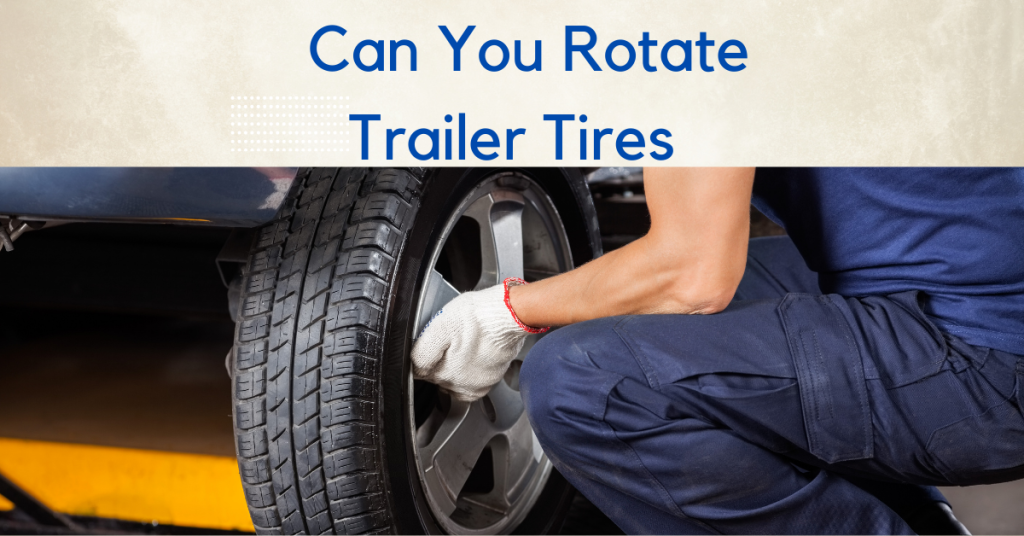
Step-by-Step Guide: Rotating Your Tires:
- Begin by parking your vehicle on a flat surface and engaging the parking brake for safety.
- Loosen the lug nuts on all the tires, but do not remove them completely.
- Jack up the vehicle using a sturdy jack and support it with jack stands to prevent accidents.
- Remove the tires one at a time, following the recommended rotation pattern.
- Mount each tire in its new position and tighten the lug nuts securely in a star pattern to ensure even tightening.
- Lower the vehicle back to the ground and remove the jack stands, then tighten the lug nuts again to ensure they are properly secured.
- It’s generally recommended to rotate your tires every 5,000 to 7,000 miles, or as specified in your vehicle’s manual.
You May also like This: Should I Cover My Trailer Tires
The Importance of Regular Tire Rotation
Rotating trailer tires regularly is necessary for several reasons. First, it extends the life of the tires. When tires wear evenly, they last longer, saving you money in the long run. Second, it ensures a smoother and safer ride. Evenly worn tires provide better stability and traction, which is essential for safe towing. Regular rotation also helps maintain balanced handling of the trailer, especially important in challenging driving conditions.
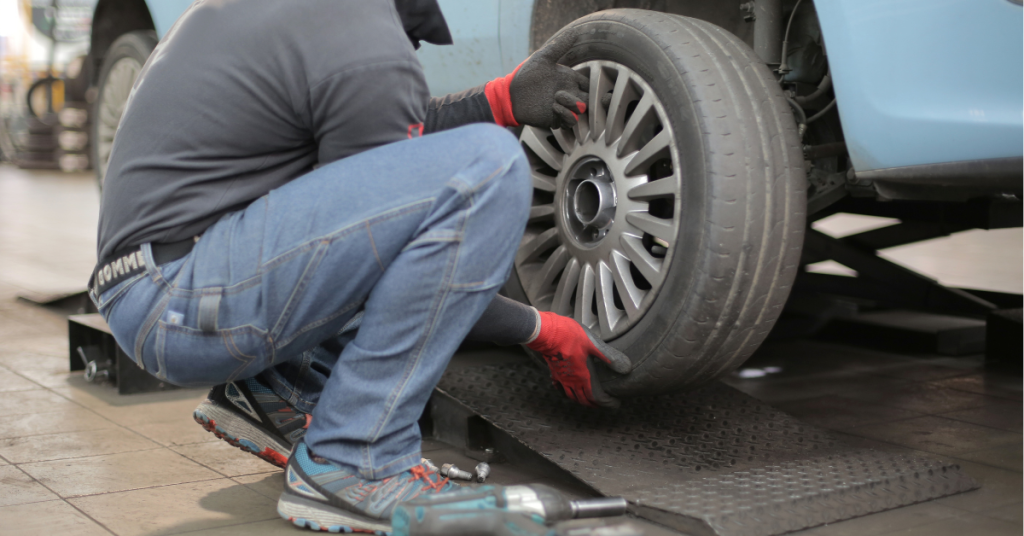
Reasons to Rotate Your Trailer Tires
Can you rotate Trailer Tires There are several causes for uneven tire wear that rotation can address. For example, if one side of the tires gets more sun or if the trailer is loaded unevenly, the tires on that side might wear out faster. Also, the front and back tires often wear at different rates because of their position in relation to the trailer’s center of gravity and braking forces. Rotating the tires compensates for these uneven wear patterns.
How Often to Rotate Your Trailer Tires
Can you rotate Trailer Tires It’s generally recommended to rotate your trailer tires every 5,000 to 8,000 miles. However, this can vary based on how often you use your trailer and under what conditions. Keeping a regular check on the wear pattern of your tires will guide you on the right time for rotation. Whether you do it yourself or take your trailer to a professional, tire rotation is a step you shouldn’t skip.
Rotating trailer tires is something I’ve learned not to overlook. It’s more than just moving tires around; it’s about keeping them working right for longer. This simple step can save a lot of money and trouble down the road after knowing about Can you rotate Trailer Tires.
Even wear from rotating tires means a smoother and safer journey. I’ve noticed that when I keep up with tire rotation, my trailer handles better, especially on long trips.
So, Can you rotate Trailer Tires remember to rotate your trailer tires regularly. It’s an easy part of maintenance that has big benefits. It keeps you safe and ensures your trailer is always ready for the road. Good tire care means a better, safer towing experience every time.
Can you rotate trailer tires yourself?
Yes, you can rotate trailer tires yourself if you have the right tools. You’ll need a jack and tire iron. It’s important to lift the trailer safely and follow the right pattern for rotation.
How do you know when to rotate trailer tires?
You should rotate your trailer tires every 5,000 to 8,000 miles. Also, if you notice uneven wear on the tires, that’s a sign they need rotating. Keeping track of mileage helps.
Is tire rotation necessary for all trailers?
Yes, all trailers benefit from tire rotation. It helps the tires wear evenly, which is important for safety and tire longevity, no matter the trailer size or type.
Does tire rotation affect trailer warranty?
Tire rotation shouldn’t affect your trailer warranty. In fact, many manufacturers recommend regular rotation as part of standard maintenance, which can help maintain the warranty.
Similar Posts
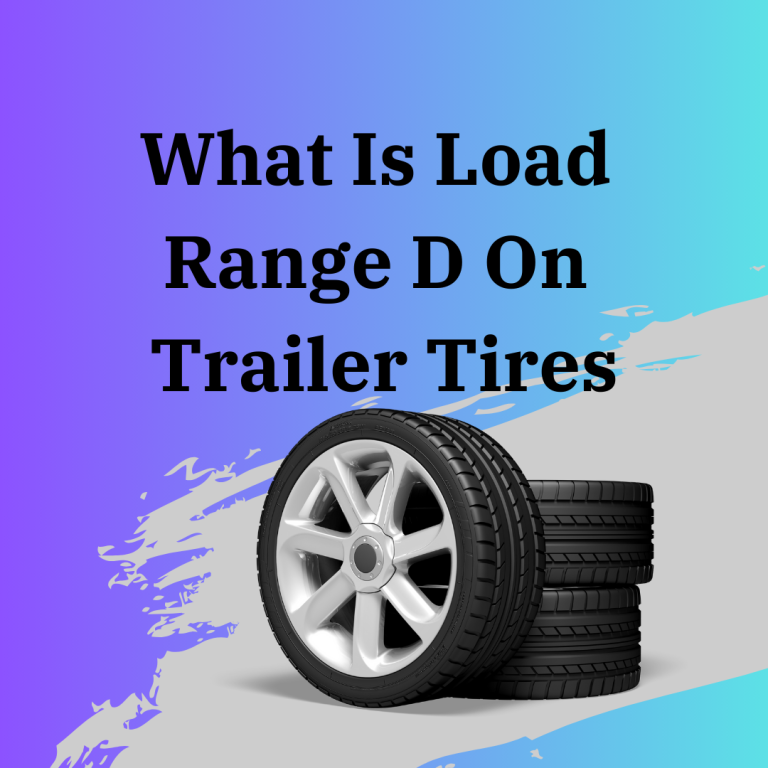
What Is Load Range D On Trailer Tires? 5 easy steps
Whenever you stood in front of your trailer, looking at the tires and noticed the term “Load Range D”…
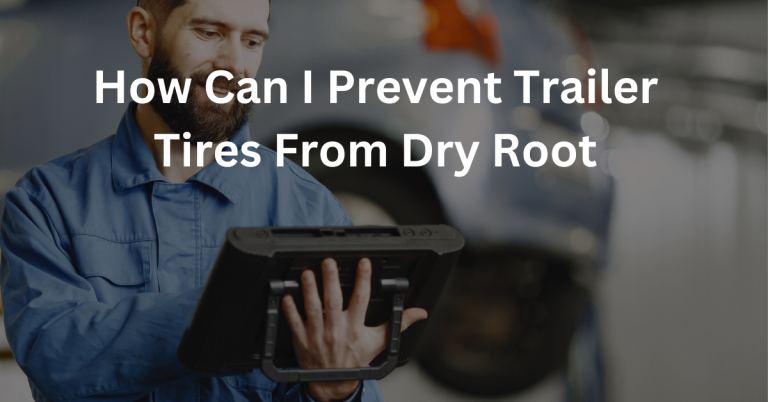
How can i Prevent Trailer tires from Dry root? | 10 tips to protect
Imagine this: you’re all set for a weekend trip, your trailer is hooked up and good to go. But,…
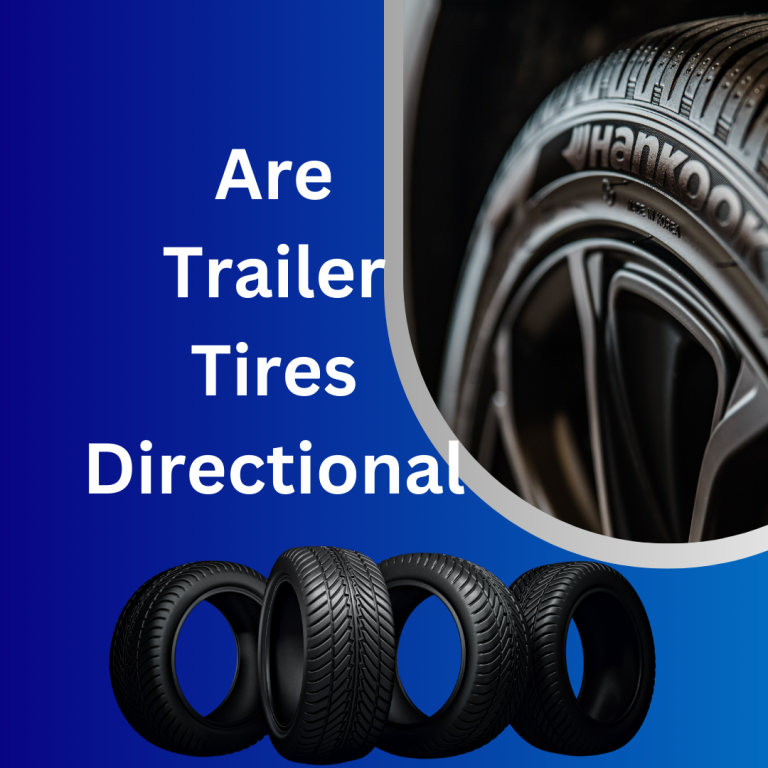
Are Trailer Tires Directional ? Exposed
“Are Trailer Tires Directional?” This question was on my mind when I bought my first trailer. It really puzzled…
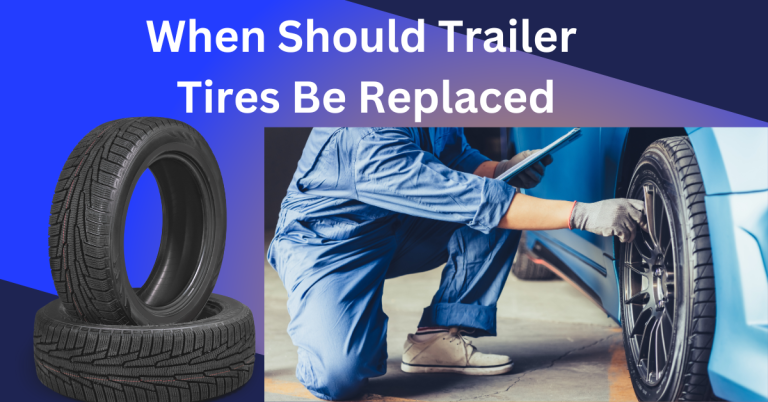
When should Trailer Tires be Replaced?|4 Critical sings
Do you ever worry about “When should Trailer Tires be Replaced”. I often do. It’s hard to know the…
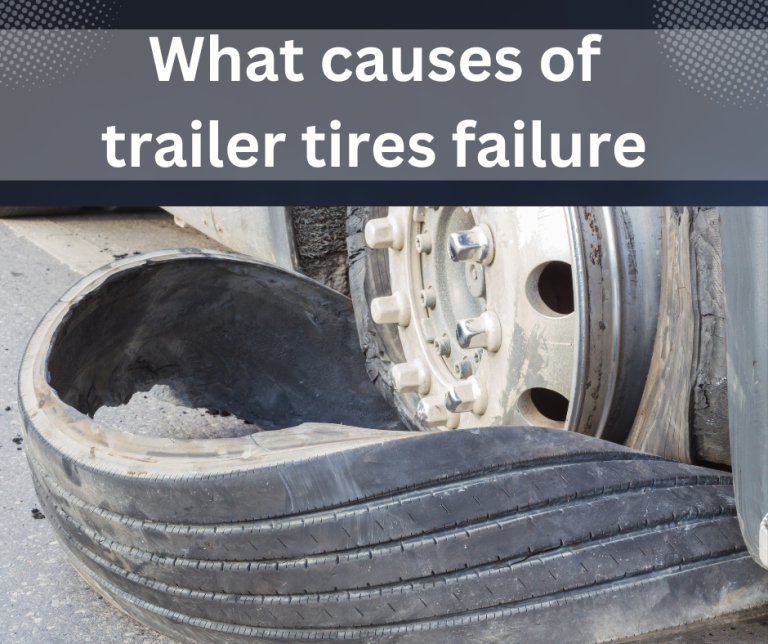
What causes of trailer tires failure? |top 10| major causes
When you’re ready for a trip with your trailer, but suddenly, a tire breaks. This situation is not just…
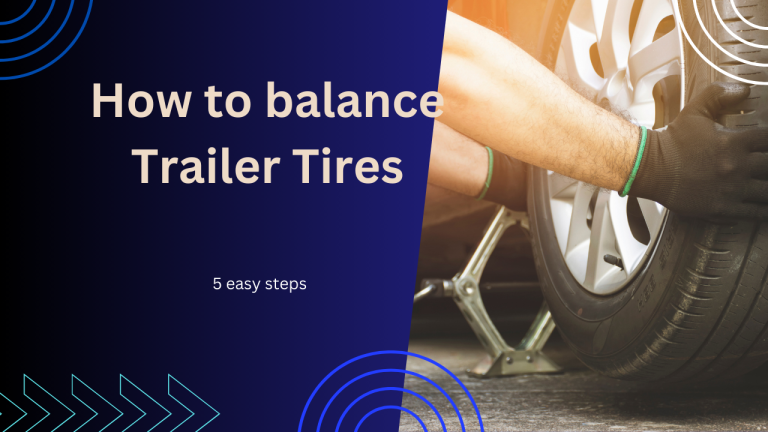
How to balance Trailer Tires? 5 easy steps
Have you ever been excited for a trip with your trailer, but then the ride starts to feel bumpy…
Nearest Store
- (907) 202-7405
- Get Directions
- Store Details
Mon-Fri: 8:00 AM - 6:00 PM
Sat: 8:00 AM - 5:00 PM
Find Another Store
Trailer and tire do’s and don’ts: answers to common questions.
Whether you’re towing a camper, a boat or a cargo trailer, whatever’s attached to your hitch needs the same attention your vehicle gets. If you’ve noticed uneven tire wear, your trailer is bouncing or you’re not sure what type of tire is best, here’s a quick FAQ.
1. Is It Okay for the Rear of My Truck to Sag When It’s Hitched to My Trailer?
You don’t want your tow vehicle to sag under the weight of your trailer. It means there’s not enough weight distributed to the front wheels of your truck or SUV and it will compromise your handling. You’ll also create uneven wear on all your tires, and they won’t last as long as they should.
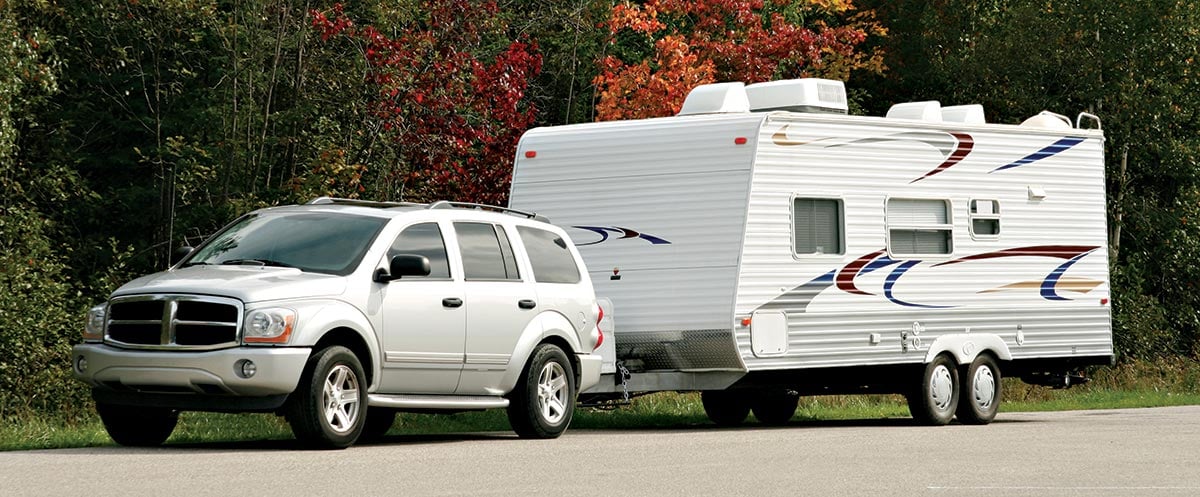
If the trailer tongue isn’t within an inch or two of being level with the ground, you need to make some adjustments.
There are many approaches to fixing an unlevel tow issue, depending on your rig:
- Adjust your trailer mount up or down to get the proper rise or drop.
- Rearrange your load. You want about 10 to 15 percent of the fully loaded trailer’s weight placed on the trailer tongue. ( Determine tongue weight , the weight a fully loaded trailer exerts downward on the hitch ball of the tow vehicle.)
- Add airbags to the suspension of your tow vehicle. This lifts up the rear and puts more weight on the front, evening out the load.
- Add helper springs to your tow vehicle.
- Use weight distribution hitches with spring bars.
2. Is It Okay to Mount Non-trailer Tires on My Travel Trailer or Should I Get Special Trailer Tires?
ST (Special Trailer) tires are a better choice. Non-trailer tires are made to carry people. ST tires are designed for carrying the heavy-duty load of travel and other trailers.
Structurally, STs have straight, solid ribs — the ribs being the circumferential bands of strong rubber separated by grooves. This makes them suited to bear heavier loads. They have about 10 percent more load capacity than light truck (LT) tires of the same size and 40 percent more than an equivalent passenger tire.
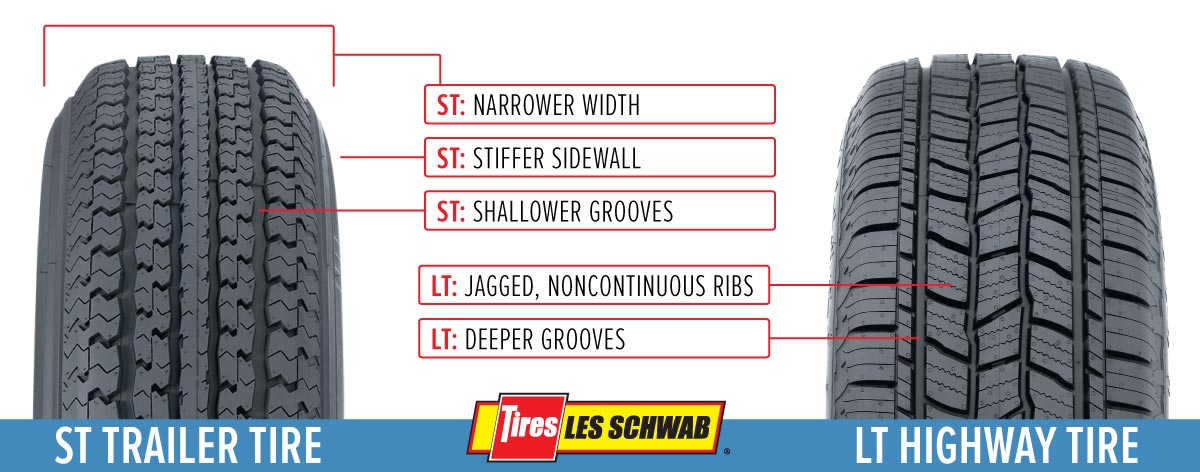
The stiffer sidewalls on ST tires improve stability and reduce swaying. These tires are usually narrower to fit standard trailer wheels. They’re designed with shallower grooves to improve fuel economy and help them run cooler, since hauling loads can generate a lot of tire heat.
Non-trailer tires have lots of voids and deeper grooves on the tread to evacuate water quickly for better traction. The ribs are often jagged and separated by grooves.
3. My Trailer Is Bouncing When Underway. What’s the Problem?
Any trailer hauled without its load will bounce. Boat trailers, for example, are made with stiff, solid axles with loose springs, which causes them to jump a lot when not weighed down.
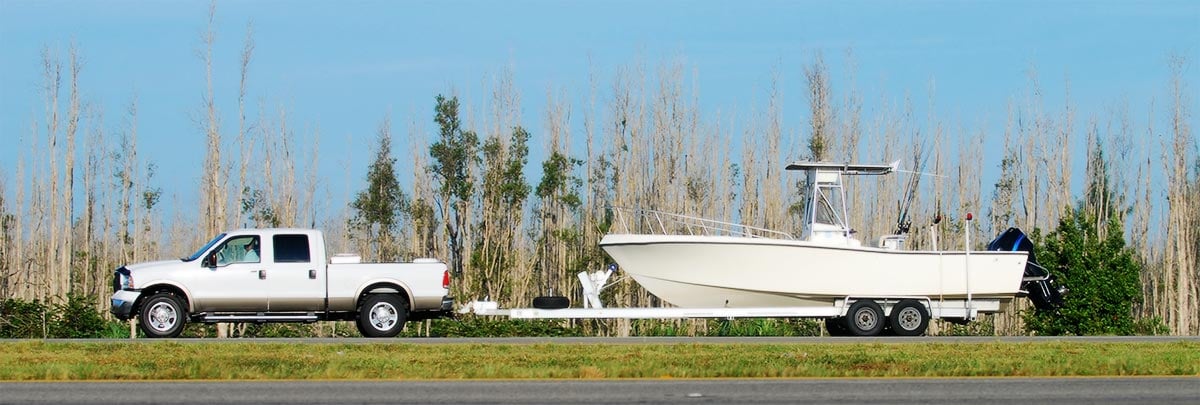
If your trailer still bounces while loaded, there could be other issues that need attention:
- Your tires aren’t properly inflated.
- Your tow vehicle’s shocks are worn or aren’t designed for the load. (You’ll feel bouncing that continues after going over a bump).
- You need to shift the weight inside the trailer.
- The trailer is overloaded and the suspension could be damaged.
- One of the trailer axles might be damaged.
- You’re not towing level (see question 1).
4. What’s Causing Uneven Wear on My Trailer Tires?
Generally, trailer tires don’t wear evenly: It’s just physics. When a tandem axle trailer with four tires takes a tight turn, the inside tires will “slide” a bit rather than roll, because they have significantly less distance to travel. Over time, this scuffs off tiny parts of the tread, creating odd wear patterns.
That said, rapid or significantly uneven trailer tire wear can be caused by:
- Riding with the wrong tire pressure.
- Exceeding your tires’ load capacity.
- Trailer misalignment or bent wheels from hitting curbs, potholes or debris.
- Not towing level, which puts more weight and strain on one axle.
- Uneven load management instead of spreading weight evenly to all wheels/tires.
If all four tires are wearing heavily on the inside , the trailer is probably overloaded.
Trailer axles are built with a slight upward curve in the middle. When the trailer is unloaded, the tops of the tires lean slightly outward (toed-out, or duck-footed). When they are carrying the weight of whatever’s loaded, the axles straighten to a flat position and the tires come to a straight up-and-down position.
When the load is too heavy, the axle bows downward in the middle, causing the tires to roll pigeon-toed (more on the inside shoulder of the tires). That’s not the normal contact patch for tires, and you’ll see pronounced wear there.
Another possibility is the axle has been flipped over (the bow in the axle that is supposed to be pointed up is actually pointed down).
If only one tire is wearing faster on the inside, you may have a bent suspension part, like a spindle. This can cause one tire to skid rather than roll smoothly down the road, creating heat and friction that wears out the rubber.
If you see faster wear on the outer tread , this may be a case of an under-loaded trailer: The trailer weight is too light to straighten out the axle. Or, outer tread wear on just one side may be a symptom of a worn suspension component.
If you notice tire cupping — a bulge on one area of the tire — the belts or plies inside (the strong cords of steel and nylon that give the tire its strength) are failing. It can be caused by tires that haven’t been properly balanced, wheel bearing problems, bad alignment or something worn out in your suspension. It can also result from excessive heat caused by going over the speed rating of your tires.
Tires on a trailer parked for a long time can develop flattened spots in the area that contacts the ground . To prevent this, simply move your trailer regularly.
Find out how to keep your trailer tires in the best condition possible in our post, 8 Great Ways to Get the Most from Your Trailer Tires .
8 Best Travel Trailer Tires. Tires for Towing a Travel Trailer or Camper
If you own a travel trailer, having the best travel trailer tires will ensure your trailer is secure and safe when you hit the road. Travel trailer tires are specially designed for use with trailers, so they have a particular tread pattern, ply rating and sidewall thickness that differs from standard car tires.
Travel trailer tires are also constructed from robust materials that are capable of withstanding the pressure they will be under as you haul your trailer. Unlike regular tires, trailer tires have a high load capacity; therefore, they can support your trailer without failing and putting yourself and other drivers at risk.
Clearly, it’s crucial that you choose the right tires travel trailer to ensure the safety of yourself and other road users. But, if you’re new to the world of trailer tires, navigating the range of options can be confusing.
If this sounds like you, don’t worry. In this guide, we have compiled a list of eight of the very best travel trailer tires on the market today, and included a useful buying guide to help you make the right choice.
Table of Contents
- 1.1 Carlisle Radial Trail HD Trailer Tire
- 1.2 Maxxis M8008 ST Radial Trailer Tire
- 1.3 Goodyear Unisteel G614 RST Radial Tire
- 1.4 Goodyear Endurance Radial Tire
- 1.5 Trailer King ST Radial Trailer Tire
- 1.6 eCustomRim Trailer Tire On Rim
- 1.7 Wheels Express Travel Trailer Tires
- 1.8 Grand Ride Trailer Tires
- 2 Compare the Best Travel Trailer Tires
- 3.2 Load Range/Load Rating and Max Weight
- 3.4 Intended Use and Cargo Weight
- 3.5 Durability, Longevity, and Sidewall Strength
- 3.6 Pressure Rating
- 3.7 Speed Rating
- 4.1 Radial Trailer Tires
- 4.2 Bias Trailer Tires
- 5 Top Travel Trailer Tires Video
- 6 Frequently Asked Questions about Travel Trailer Tires
- 7 Final Thoughts
Best Travel Trailer Tires
To save you hours of research, we have selected eight of the best travel trailer tires money can buy. We made sure to choose a variety of options with different load ranges – so there’s something to suit every setup.

Carlisle Radial Trail HD Trailer Tire

Buy from Amazon
First on our list is the Carlisle Radial Trail HD Trailer Tire . This high-quality model is specifically designed for use with travel trailers and fifth wheels. It has a 15-inch rim size and a unique tread pattern.
This improved tread pattern is designed to promote even wear across the tire over time, so you can expect reliable performance as the miles rack up. This ensures your tires last longer, remain stable, and don’t suffer from one overly-worn patch that puts you more at risk of a sudden failure on the road.
As well as this smart tread pattern, the Carlisle Radial Trail HD Trailer Tire has anti-weathering and UV protective properties that defend it from environmental damage all year around. It has also been tested to resist very high road temperatures, so you can drive your rig with confidence in the summer months.
Other great features include low rolling resistance to improve fuel economy, and an impressive 2150 pound load capacity. Thanks to their varied pitch pattern, these tires are quieter on the road than other models, too, so you can enjoy long-haul sections of your journey without an annoying whine in your ears.
With an “M” speed rating, these tires are capable of reaching up to 87mph, which is well in excess of not only the speed limit, but any speed you’re likely to reach while pulling a travel trailer. On the downside, some users have complained that these tires are a little difficult to fit – so if you’re inexperienced, you may have to pay someone else to do this for you.
All in all, the Carlisle Radial Trail HD Trailer Tire is an excellent choice of travel trailer tire for year-around travel. We like how the smart tread design promotes even wear, and the environmental protective properties ensure they can withstand tough conditions without weakening.
Maxxis M8008 ST Radial Trailer Tire

Another great choice of travel trailer tire is the Maxxis M8008 ST Radial . This model is very popular and also has an advanced tread for optimum performance and durability. This tire has a 15-inch rim size and a load capacity of 2830 pounds.
This durable tire boasts a double steel-belted design for strength and increased stability when towing. This feature should put your mind at rest if you’re pulling a large, heavy trailer on a long road trip. Many users have commented that due to these features, this tire is super reliable for extended journeys of 1,000s of miles.
Alongside this strength and stability, the Maxxis M8008 also has an advanced tread design that reduces wear and rolling resistance. This helps to improve your fuel economy and increases the overall life span of the tire, so you can get more use out of it before it requires replacing.
Another useful feature is its shock absorption qualities. If you hit the backroads and are likely to come across some bumpy routes, the integrated shock absorption is well worth having. Every time you hit a bump, the pressure in the tire momentarily increases which puts you at risk of blowouts. It’s not totally foolproof, but this feature allows you to drive over rough patches without gritting your teeth.
This model is one of the pricier options on our list, but considering its durability and reliability, we think it’s a worthwhile investment if you often head out for long-distance trips.
Goodyear Unisteel G614 RST Radial Tire

Coming from a well-known and popular manufacturer – our next pick for the best travel trailer tire is the Goodyear Unisteel G614 RST Radial Tire .
This tire has an established reputation and is easily capable of handling large trailer applications like fifth wheelers. It comes compatible with 16-inch rims and a 75mph speed rating.
Made from heavy-duty rubber, this hard-wearing tire also features a premium enhanced casing for additional toughness. The shallow tread has been specially designed to promote even wear patterns and reduce the running temperatures for increased durability. The shoulder ribs are solid and rounded to provide stability, as well as encourage even wear.
If you tend to hit the road in the summer months or don’t have a nice shaded space to park your trailer, you’ll also appreciate the UV protective qualities. Of course, you should still cover your tires during storage, but it’s good to know that they can handle summer road trips in strong sunshine and high temperatures.
This model provides a single max load of 3,750 pounds, or a dual load limit of 3,415 pounds – making it ideal for weighty applications. We also like that Goodyear offers a free replacement service within either 12 months or the first 2/32″ of treadwear, whatever comes first – another reason to trust the quality of their products.
This model is pretty expensive, but if you need a heavy-duty tire that can handle heavy loads, you can’t go wrong with this tire.
Goodyear Endurance Radial Tire

Another great pick from Goodyear is the Goodyear Endurance Radial Tire . This model fits a 14-inch rim size and has a lower load capacity of 1,700 pounds, so it’s better suited to lighter trailer loads.
The Goodyear Endurance Radial Tire is made from enhanced rubber compound materials for high-strength and durability. It includes a scuff guard to shield the edges of the tire wall from damage if you get too close to the curb, or brush against the undergrowth on narrow roads.
The fabric-steel design of this tire is incredibly rugged, which makes it a good option for long distance trips where the roads could be a little rough. Even though it has all these resilience features, it’s still fully compatible with standard tire inflation stations and pressure monitoring systems, so you shouldn’t have any trouble maintaining them during your journey.
Created for endurance, these tires are resistant to temperature increases and maintain a good, stable tracking when towing. The tread is designed to wear evenly as the miles pass by, so you won’t need to worry about the blowout risk from weak spots developing over time.
This tire may be a little awkward to install if you’re not used to doing it yourself. Thankfully, Goodyear offers a reasonably-priced professional install service, so you can take advantage of this to save yourself the hassle. These tires also come with Goodyear’s free replacement service if the tire fails within 12 months or the first 2/32″ of treadwear – providing peace of mind that you’re covered in the event something unexpected happens.
Trailer King ST Radial Trailer Tire

Next up we have the Trailer King ST Radial Trailer Tire . This durable model is a great choice for RV owners, thanks to its strength, resilience and range of safety features.
One key feature of this travel trailer tire is its center groove. This groove ensures consistent tracking and keeps your tires stable, so you can drive with added peace of mind that your tires are working to keep your setup balanced and secure. The groove also assists with grip in poor weather conditions, which is great if you take trips in your RV all year round.
This model has a load capacity of 2833 pounds, making it ideal for heavy applications. The nylon overlay construction adds extra strength that allows it to easily handle hefty loads without wearing quickly, so it’s a good choice for long distance trips when you’re hauling a lot of weight.
The Trailer King ST Radial Trailer Tire has a more than adequate, “M” speed rating of 81mph. The improved shoulder design also ensures better heat dissipation on the road, so the tread lasts longer while wearing evenly to avoid weak spots. We also appreciate the enhanced tread depth – which helps to reduce rolling resistance and avoid any troublesome heat build up from occurring in the first place.
These tires are great for long haul trips pulling heavy loads, but with constant use under this type of strain, some users found that they failed after a couple years. Considering the reasonable price, though, you’ll be hard-pressed to find an equally robust tire for less.
eCustomRim Trailer Tire On Rim

If you’re looking for highly-affordable, easy-install tires that come complete with rims, then this model is worth checking out. eCustomRim is a well-known name in the States, so you can have confidence in the quality of their products.
This tire has a 15-inch rim diameter, with a 5 Lug 4.5″ center and the 205/75D15 size is compatible with the majority of popular trailer brands – so you shouldn’t have any trouble getting it fitted.
Built for durability, this tire has a 6-ply construction – which puts it in the C category for load range. It has a maximum weight capacity of 1820 pounds per tire, which is suitable for most moderate loads.
If you’re heading out for long drives on the highway, the M speed rating of 81mph is plenty for the needs of RV’ers. It also has good resilience in poor weather conditions, so this tire should keep you stable in heavy rain or snowy roads. The 7.8/32″ tread depth offers good levels of grip and a decent lifespan with regular use.
Overall, these tires are an excellent pick for the price, especially as they come with rims included. They’re well made, fit most types of trailers and cope well in poor weather conditions. We also like that they come with a 5-year warranty, so you can rest-assured you’ll get a good lifespan out of them.
Wheels Express Travel Trailer Tires

Next up we have the Wheels Express Travel Trailer Bias Tire . This 14-inch model comes fully mounted on the rim and ready to fit – so it’s a great option if you’re looking for the full package.
Unlike radial tires, this bias tire has a much stiffer sidewall, which makes it an excellent choice if you’re planning on hitting the backroads where the surface can be a little bumpier. The higher level of rigidity also means this tire is good for stabilizing your trailer and reducing any potential sway that you may experience while towing.
If you often tow heavy applications, this tire is a great match. It has a load range rating of “C”, which means it is capable of supporting loads up to 1820 pounds per tire. It also has a 6 ply construction and is steel belted for better traction and reduced fuel consumption.
We particularly like how convenient this tire is to use. As it comes with a wheel and 4X5 5X4.5 lug pattern, you can go right ahead and install it as soon as you receive it. This saves a lot of time searching for compatible rims and fitting tires separately if you’re starting out with nothing. The price is very reasonable too.
On the downside, if you’re a heavy user pulling hefty loads, this tire may not last as long as other models. Some RV’ers have complained that the tread wore pretty low after a couple thousand miles – so you’ll have to decide if these tires’ qualities fit your intended usage.
Grand Ride Trailer Tires

Last but not least, we have the Grand Ride Trailer Tires . These trailer tires share many of the features we have seen in the other models on our list, but they come in a superb-value pack of four.
This radial tire provides fantastic grip and stability for your trailer to prevent swaying. It also has a max weight capacity of 2150 pounds at 65psi – making it a D-rated tire that’s suitable for heavier applications.
In addition to the reliable grip, this tire has a nylon overlay throughout the tread area, as well as the shoulder area, to protect it and reduce wear. The tire wall also has a special “scuff guard” to ward off damage from those occasional bumps against curbs and rocks.
We were a little disappointed to see that these tires only come with a one year warranty. However, Grand Ride says they have been selling these tires wholesale to trailer manufacturers all across the US, so that’s a good indication that they are of trusted quality.
If you’re looking to get a brand new set of four wheels, keep in mind that unlike the Wheels Express Tires, these don’t come with included rims, so you’ll have to buy them separately if required. That said, considering the price is for four tires, you’re still getting a great deal overall.
Compare the Best Travel Trailer Tires

Buyer’s Guide to Buying the Best Travel Trailer Tires
If you’re unsure which travel trailer tires are the best for your needs, read through our in-depth buying guide below. We explain everything you need to consider before making your purchase.
The best travel trailer tires aren’t cheap, and nor should they be. High-quality tires are crucial to your safety, so this isn’t a time to look for the absolute cheapest option you can find.
The average cost for a good-quality travel trailer tire is around $170. Some tires will cost more, others less, but this is a good benchmark of what you can expect to pay.
Tires from highly-respected brands that have higher load limits and enhanced safety/longevity features can cost twice as much, at around $300. Lesser-known brands that still offer great-quality tires may go for less, at around $80-$130 – although you may find yourself having to replace them more often.
If you have the budget and are planning to do some serious mileage, we recommend opting for the best travel trailer tires you can afford. The biggest brands also tend to offer the most generous warranties, so you can be confident that your tires will last.
Load Range/Load Rating and Max Weight
Before purchasing a trailer tire, it’s critical to check that it has the correct load range/rating to handle your setup. This figure is easy to find on the sidewall of the tire, and will tell you the maximum load that the tire can manage.
The most common load ranges for trailer tires will be categorized under these letters – B, C, D and E. Each letter corresponds to a maximum load range a tire can handle at the recommendation inflation pressure, measured in pounds.
If you had a single axle trailer with C load range tires (max load 1820lbs), you can haul a maximum load of 3640 pounds (2×1820).
However, if you have a double-axle trailer, you must reduce the max load rating by 12% and work on that figure. This means the maximum you could haul with a double-axle trailer would be 3204 pounds.
Clearly, it’s very important to check these figures and be aware exactly how much weight you’re towing before choosing tires for your travel trailer. Making the wrong choice could have dangerous consequences.
The best size travel trailer tire will depend on your trailer. The original tires that came with your trailer will have a size code on their sidewall, which consists of a combination of letters and numbers.
For example, the code “ST205/75R15” tells you a number of things.
First of all, the letters “ST” stand for “special trailer tire”, so you know that this tire is for use with trailers only.
“205” refers to the width of the tread in millimeters, while the following numbers, “75” tell you the height of the sidewall as a percentage of the tread width.
Last of all, the letter “R” means “radial tire” and the number “15” means that it’s made to fit a 15-inch rim.
Not all tires have a code as long as this, though. Smaller tires, (sub 12-inch models) usually have a shorter code. The first number will indicate the width of the tread, while the second number tells you the rim size.
Once you’ve got the hand of deciphering this code, finding the right size tires for your travel trailer will be a walk in the park.
Intended Use and Cargo Weight
Another key consideration before buying new travel trailer tires is your intended use. If you’re only planning to be pulling your small trailer a couple times a year, you’re going to need very different tires from someone hauling a heavy application every weekend.
The same is true when it comes to the routes you usually take. If you usually hit the highways, it’s best to choose a radial tire, as a bias tire is highly unlikely to last under these conditions. On the other hand, if you spend most of your time in the backcountry on bumpy roads, then a bias tire is a better choice. (We’ll explain more about different types of trailer tires later).
Aside from this, you’ll also need to think about the amount of weight you’re going to be hauling. Don’t forget that this is the total weight of your trailer, including everything inside it, too. To be extra safe, it’s best to opt for a set of tires that with a load limit that comfortably exceeds the weight of your rig.
Durability, Longevity, and Sidewall Strength
It should go without saying, but when hauling a trailer, you’re going to want to get a set of tires that have a good level of durability, a decent lifespan, and have high sidewall strength.
You simply don’t want to risk hauling a trailer with low quality tires. This is not only very dangerous for you, but for everyone else on the road too. The best way to ensure you’re getting a high-quality tire is to opt for well-respected brands who have been in the game for a long time and earned their reputation.
Double steel belted tires with additional shoulder scuff guards and nylon overlays are great for strength and durability. Longevity really depends on your usage level, but it’s better to choose a tire with enhanced tread patterns that promote even wear and reduce the risk of isolated weak spots occurring.
Pressure Rating
Tire pressure rating is another top consideration that shouldn’t be overlooked. The stability and safety of your trailer when towing is reliant on your tires being inflated to the correct level of pressure.
If you over-inflate your tires, this will reduce the contact area and result in faster wearing in the center of your tires. If you underinflate them, they’ll wear out more quickly on the shoulders, reduce your fuel economy and are more likely to puncture. As you can see, there’s no good results here – the only way to get the best performance from your tires is to ensure you inflate them to the right level.
You can find out the correct psi level for your trailer load on the side of the tire. This will tell you the required pressure level for the tire to support the load they are rated to. If you don’t inflate the tire to the psi that’s recommended, you cannot be confident that the tire will be able to support the weight capacity as stated.
If you’re changing your load and are unsure what pressure you should inflate your tires to – you can always call the manufacturer or a local tire dealer for advice.
Speed Rating
The speed rating tells you the max speed that a tire can maintain safely over time.
Most travel trailer tires will have a speed rating that is well above the speed you are likely to, (or should be!) reaching when pulling your trailer.
Speed rating is also displayed in a lettering code. A common speed rating you’re likely to come across is “M” – which correlates to 81mph, but you should always double check before buying.
Types of Travel Trailer Tires
There are two main types of travel trailer tire: Radial and Bias. In this section, we take a look at each type alongside their advantages and drawbacks.
Radial Trailer Tires
Radial trailer tires are the most expensive type. They have steel belts inside them that are positioned at a 90-degree angle from the centerline of the tread. This enables radial tires to grip the road better, offers good stability, flexibility and reduces tread wear over time.
These features allow radial tires to remain at cooler temperatures than bias tires. For this reason, radial tires are the better choice if you tend to go on long-haul trips and spend a lot of time on the highway.
The steel belt inside radial tires also means they are less likely to develop flat spots when you leave your trailer parked up for long periods – so they are a great option if you’re planning to store your RV away for the season or pitch up somewhere for an extended time.
Bias Trailer Tires
Bias trailer tires are cheaper, but they are also constructed differently from radial tires.
Bias tires are made with piles that are made with multiple rubber belt plies that are laid at 30-degree angles, overlapping each other. The sidewall is less flexible than radial tires, and as a result, they perform better in off-road environments, so they can be a good choice if you’re mostly out in the backcountry.
The more rigid sidewall of bias tires means that they are also capable of handling a higher load capacity than radial tires, but on the downside, they don’t have a very long lifespan.
Many bias tires fail at around 12,000 miles, so this makes them a less attractive option for travel trailer owners who do a lot of mileage.
Top Travel Trailer Tires Video
Frequently Asked Questions about Travel Trailer Tires
When it comes to travel trailer tires, there are numerous factors to consider to ensure a safe and enjoyable journey. From load capacity and size to tread pattern and durability, choosing the right tires for your travel trailer is essential. To help you navigate through the common queries and concerns surrounding travel trailer tires, we have compiled a list of frequently asked questions. Whether you’re a seasoned RV enthusiast or a first-time traveler, this FAQ section aims to provide clarity and guidance on selecting the best travel trailer tires for your needs. Read on to find answers to your burning questions and gain valuable insights into maintaining and optimizing the performance of your travel trailer tires.
Why are travel trailer tires important?
Travel trailer tires play a crucial role in ensuring a safe and comfortable travel experience. They provide stability, traction, and control while towing your trailer, and they are designed to withstand the unique demands of RV travel.
What are the key factors to consider when choosing travel trailer tires?
When selecting the best travel trailer tires, it’s important to consider factors such as tire size, load capacity, speed rating, tread pattern, durability, and weather performance. It’s also essential to ensure that the tires are suitable for your specific trailer weight and towing requirements.
How often should I replace my travel trailer tires?
The lifespan of travel trailer tires varies depending on factors such as tire quality, usage, and maintenance. As a general guideline, it is recommended to replace travel trailer tires every five to six years, regardless of the tread depth, to prevent potential safety risks.
Can I use regular passenger vehicle tires on my travel trailer?
It is not recommended to use regular passenger vehicle tires on a travel trailer. Travel trailer tires are specifically designed to handle the unique load and towing demands of an RV. They have reinforced sidewalls, stronger construction, and higher load-carrying capacities, which differ from those of regular passenger tires.
What is the proper way to maintain travel trailer tires?
Proper maintenance is essential to ensure the longevity and performance of travel trailer tires. Regularly inspect the tires for signs of wear, maintain proper inflation pressure, rotate the tires as recommended by the manufacturer, and store the trailer in a cool, dry place when not in use. Additionally, keep an eye on the tread depth and consider getting your tires balanced and aligned for optimal performance.
Are there specific tire brands that are recommended for travel trailers?
There are several reputable tire brands known for producing quality travel trailer tires, such as Goodyear, Michelin, BF Goodrich, Carlisle, and Maxxis, among others. However, the best tire brand for your travel trailer may depend on your specific needs, budget, and the type of RV you own.
How can I determine the appropriate tire size for my travel trailer?
To determine the correct tire size for your travel trailer, you can refer to the information provided by the trailer manufacturer, consult the owner’s manual, or check the existing tires on your RV. The tire size is typically indicated by a series of numbers and letters on the sidewall, such as “ST225/75R15,” where “ST” indicates a special trailer tire.
Can I replace just one tire, or should I replace all of them at the same time?
Ideally, it is recommended to replace all travel trailer tires at the same time. This helps maintain even tread wear, ensures balanced performance, and minimizes the risk of tire failure. However, if only one tire needs replacement due to damage or wear, it is essential to choose a tire with the same specifications as the existing ones to maintain proper load capacity and compatibility.
Are there any specific considerations for travel trailer tires in different weather conditions?
Travel trailer tires should be suitable for the weather conditions you expect to encounter during your travels. In colder climates, consider tires with a winter or all-season rating, as they provide better traction on icy or snowy roads. In hotter climates, choose tires that can handle high temperatures without compromising performance or durability.
Can I install the tires on my travel trailer myself, or should I have them professionally installed?
While it is possible to install travel trailer tires yourself, it is recommended to have them professionally installed to ensure proper mounting, balancing, and alignment. Professional tire installation can also help identify any underlying issues and provide expert advice on tire maintenance and care.
Remember, selecting the right travel trailer tires is essential for your safety and the overall performance of your RV. Consult with tire experts, read reviews, and consider your specific needs before making a decision.
Final Thoughts
Choosing the best travel trailer tire for your needs is not only crucial for the safety of yourself and other road users, it can also improve trailer stability and save you money in the long term.
The right option for you is dependent on your trailer, but if you haul a heavy load, then the Goodyear Unisteel G614 RST Radial Tire could be your best bet. This model is made from heavy-duty rubber that’s highly durable and has an impressive load range of 3,750 pounds per tire. The tread is specially designed to wear down evenly to prevent weak spots from occurring, and the shoulders are rounded to provide stability.
For more mid-range loads, then either the Maxxis M8008 ST Radial Trailer Tire or the Trailer King ST Radial Trailer Tire are worth a look. These models have load ratings of 2,830 pounds and 2,833 pounds respectively, offer great durability and an advanced tread design for optimum performance.
Alternatively, if you pull lighter loads, then the Goodyear Endurance Radial Tire could be right for you. This tire can handle 1,700 pounds, has a rugged fabric-steel design which is great for long distance trips, and has scuff guards to protect against accidental damage.
About The Author
Karan Riley

Russia's Nuclear Deterrent Command Center Imperiled by Winter Freeze—Report
A Russian nuclear deterrent command center in Moscow has been imperiled by power outages that have impacted more than one-quarter of the region's cities amid freezing temperatures, a Russian Telegram channel has reported.
The VChK-OGPU outlet, which purports to have inside information from Russian security forces, reported that the 820th Main Center for Missile Attack Warnings—part of the Russian Space Forces, a branch of the country's Aerospace Forces—near Solnechnogorsk in Moscow is without power.
It serves as the space forces early warning network against potential ballistic missile attacks.
The development comes as Russians are reported to be suffering from power outages in their homes in the Moscow region caused by technical issues at plants amid subzero temperatures.
On January 4, a heating main burst at the Klimovsk Specialized Ammunition Plant in the town of Podolsk, which is about 30 miles south of central Moscow. Since then, tens of thousands of Russians are reported to have no heating in their homes.
Affected areas include the cities of Khimki, Balashikha, Lobnya, Lyubertsy, Podolsk, Chekhov and Naro-Fominsk, a map published by a Russian Telegram channel and shared on other social media sites shows.
Other Russian media outlets reported that in Moscow, residents of Balashikha, Elektrostal, Solnechnogorsk, Dmitrov, Domodedovo, Troitsk, Taldom, Orekhovo-Zuyevo, Krasnogorsk, Pushkino, Ramenskoye, Voskresensk, Losino-Petrovsky and Selyatino are also without power.
The Telegram channel said that at the 820th Main Center for Missile Attack Warnings, "the crew...is on duty around the clock."
"It is here that the decision on a retaliatory nuclear strike is executed," the channel said.
Newsweek could not independently verify the report and has reached out to the Russian Defense Ministry by email for comment.
Power outages have also been reported in Russia's second-largest city, St. Petersburg, in the country's western Voronezh region, in the southwest city of Volgograd, and in Rostov, which borders Ukraine, a country that Russia has been at war with since February 24, 2022.
On Sunday, two shopping malls in St. Petersburg were forced to close because of problems with light and heating, reported local news outlet 78.ru. Hundreds of other homes in the city have had no electricity, water or heating for days amid temperatures of -25 C (-13 F).
Russian authorities have also been forced to compensate passengers of a train that ran from Samara to St. Petersburg (a 20-hour journey) without heating during -30 C (-22 F) temperatures. Videos circulating on social media showed carriage windows frozen over. A passenger also said the toilet didn't work during the trip because of frozen pipes.
Do you have a tip on a world news story that Newsweek should be covering? Do you have a question about the Russia-Ukraine war? Let us know via [email protected].
Related Articles
- Russia Maps Show 25% of Moscow Without Power Amid Winter Freeze 'Emergency'
- Serbian Mercenary Turns on Russian Leaders: 'They Treat Us Like Cattle'
- Winter Freeze Threats Come Back To Bite Russia As Power Outages Spread
Start your unlimited Newsweek trial


Turn Your Curiosity Into Discovery
Latest facts.

Follistatin344 Peptide Considerations

Approach for Using 5 Tips To Help You Write Your Dissertation
40 facts about elektrostal.
Written by Lanette Mayes
Modified & Updated: 02 Mar 2024
Reviewed by Jessica Corbett

Elektrostal is a vibrant city located in the Moscow Oblast region of Russia. With a rich history, stunning architecture, and a thriving community, Elektrostal is a city that has much to offer. Whether you are a history buff, nature enthusiast, or simply curious about different cultures, Elektrostal is sure to captivate you.
This article will provide you with 40 fascinating facts about Elektrostal, giving you a better understanding of why this city is worth exploring. From its origins as an industrial hub to its modern-day charm, we will delve into the various aspects that make Elektrostal a unique and must-visit destination.
So, join us as we uncover the hidden treasures of Elektrostal and discover what makes this city a true gem in the heart of Russia.
Key Takeaways:
- Elektrostal, known as the “Motor City of Russia,” is a vibrant and growing city with a rich industrial history, offering diverse cultural experiences and a strong commitment to environmental sustainability.
- With its convenient location near Moscow, Elektrostal provides a picturesque landscape, vibrant nightlife, and a range of recreational activities, making it an ideal destination for residents and visitors alike.
Known as the “Motor City of Russia.”
Elektrostal, a city located in the Moscow Oblast region of Russia, earned the nickname “Motor City” due to its significant involvement in the automotive industry.
Home to the Elektrostal Metallurgical Plant.
Elektrostal is renowned for its metallurgical plant, which has been producing high-quality steel and alloys since its establishment in 1916.
Boasts a rich industrial heritage.
Elektrostal has a long history of industrial development, contributing to the growth and progress of the region.
Founded in 1916.
The city of Elektrostal was founded in 1916 as a result of the construction of the Elektrostal Metallurgical Plant.
Located approximately 50 kilometers east of Moscow.
Elektrostal is situated in close proximity to the Russian capital, making it easily accessible for both residents and visitors.
Known for its vibrant cultural scene.
Elektrostal is home to several cultural institutions, including museums, theaters, and art galleries that showcase the city’s rich artistic heritage.
A popular destination for nature lovers.
Surrounded by picturesque landscapes and forests, Elektrostal offers ample opportunities for outdoor activities such as hiking, camping, and birdwatching.
Hosts the annual Elektrostal City Day celebrations.
Every year, Elektrostal organizes festive events and activities to celebrate its founding, bringing together residents and visitors in a spirit of unity and joy.
Has a population of approximately 160,000 people.
Elektrostal is home to a diverse and vibrant community of around 160,000 residents, contributing to its dynamic atmosphere.
Boasts excellent education facilities.
The city is known for its well-established educational institutions, providing quality education to students of all ages.
A center for scientific research and innovation.
Elektrostal serves as an important hub for scientific research, particularly in the fields of metallurgy, materials science, and engineering.
Surrounded by picturesque lakes.
The city is blessed with numerous beautiful lakes, offering scenic views and recreational opportunities for locals and visitors alike.
Well-connected transportation system.
Elektrostal benefits from an efficient transportation network, including highways, railways, and public transportation options, ensuring convenient travel within and beyond the city.
Famous for its traditional Russian cuisine.
Food enthusiasts can indulge in authentic Russian dishes at numerous restaurants and cafes scattered throughout Elektrostal.
Home to notable architectural landmarks.
Elektrostal boasts impressive architecture, including the Church of the Transfiguration of the Lord and the Elektrostal Palace of Culture.
Offers a wide range of recreational facilities.
Residents and visitors can enjoy various recreational activities, such as sports complexes, swimming pools, and fitness centers, enhancing the overall quality of life.
Provides a high standard of healthcare.
Elektrostal is equipped with modern medical facilities, ensuring residents have access to quality healthcare services.
Home to the Elektrostal History Museum.
The Elektrostal History Museum showcases the city’s fascinating past through exhibitions and displays.
A hub for sports enthusiasts.
Elektrostal is passionate about sports, with numerous stadiums, arenas, and sports clubs offering opportunities for athletes and spectators.
Celebrates diverse cultural festivals.
Throughout the year, Elektrostal hosts a variety of cultural festivals, celebrating different ethnicities, traditions, and art forms.
Electric power played a significant role in its early development.
Elektrostal owes its name and initial growth to the establishment of electric power stations and the utilization of electricity in the industrial sector.
Boasts a thriving economy.
The city’s strong industrial base, coupled with its strategic location near Moscow, has contributed to Elektrostal’s prosperous economic status.
Houses the Elektrostal Drama Theater.
The Elektrostal Drama Theater is a cultural centerpiece, attracting theater enthusiasts from far and wide.
Popular destination for winter sports.
Elektrostal’s proximity to ski resorts and winter sport facilities makes it a favorite destination for skiing, snowboarding, and other winter activities.
Promotes environmental sustainability.
Elektrostal prioritizes environmental protection and sustainability, implementing initiatives to reduce pollution and preserve natural resources.
Home to renowned educational institutions.
Elektrostal is known for its prestigious schools and universities, offering a wide range of academic programs to students.
Committed to cultural preservation.
The city values its cultural heritage and takes active steps to preserve and promote traditional customs, crafts, and arts.
Hosts an annual International Film Festival.
The Elektrostal International Film Festival attracts filmmakers and cinema enthusiasts from around the world, showcasing a diverse range of films.
Encourages entrepreneurship and innovation.
Elektrostal supports aspiring entrepreneurs and fosters a culture of innovation, providing opportunities for startups and business development.
Offers a range of housing options.
Elektrostal provides diverse housing options, including apartments, houses, and residential complexes, catering to different lifestyles and budgets.
Home to notable sports teams.
Elektrostal is proud of its sports legacy, with several successful sports teams competing at regional and national levels.
Boasts a vibrant nightlife scene.
Residents and visitors can enjoy a lively nightlife in Elektrostal, with numerous bars, clubs, and entertainment venues.
Promotes cultural exchange and international relations.
Elektrostal actively engages in international partnerships, cultural exchanges, and diplomatic collaborations to foster global connections.
Surrounded by beautiful nature reserves.
Nearby nature reserves, such as the Barybino Forest and Luchinskoye Lake, offer opportunities for nature enthusiasts to explore and appreciate the region’s biodiversity.
Commemorates historical events.
The city pays tribute to significant historical events through memorials, monuments, and exhibitions, ensuring the preservation of collective memory.
Promotes sports and youth development.
Elektrostal invests in sports infrastructure and programs to encourage youth participation, health, and physical fitness.
Hosts annual cultural and artistic festivals.
Throughout the year, Elektrostal celebrates its cultural diversity through festivals dedicated to music, dance, art, and theater.
Provides a picturesque landscape for photography enthusiasts.
The city’s scenic beauty, architectural landmarks, and natural surroundings make it a paradise for photographers.
Connects to Moscow via a direct train line.
The convenient train connection between Elektrostal and Moscow makes commuting between the two cities effortless.
A city with a bright future.
Elektrostal continues to grow and develop, aiming to become a model city in terms of infrastructure, sustainability, and quality of life for its residents.
In conclusion, Elektrostal is a fascinating city with a rich history and a vibrant present. From its origins as a center of steel production to its modern-day status as a hub for education and industry, Elektrostal has plenty to offer both residents and visitors. With its beautiful parks, cultural attractions, and proximity to Moscow, there is no shortage of things to see and do in this dynamic city. Whether you’re interested in exploring its historical landmarks, enjoying outdoor activities, or immersing yourself in the local culture, Elektrostal has something for everyone. So, next time you find yourself in the Moscow region, don’t miss the opportunity to discover the hidden gems of Elektrostal.
Q: What is the population of Elektrostal?
A: As of the latest data, the population of Elektrostal is approximately XXXX.
Q: How far is Elektrostal from Moscow?
A: Elektrostal is located approximately XX kilometers away from Moscow.
Q: Are there any famous landmarks in Elektrostal?
A: Yes, Elektrostal is home to several notable landmarks, including XXXX and XXXX.
Q: What industries are prominent in Elektrostal?
A: Elektrostal is known for its steel production industry and is also a center for engineering and manufacturing.
Q: Are there any universities or educational institutions in Elektrostal?
A: Yes, Elektrostal is home to XXXX University and several other educational institutions.
Q: What are some popular outdoor activities in Elektrostal?
A: Elektrostal offers several outdoor activities, such as hiking, cycling, and picnicking in its beautiful parks.
Q: Is Elektrostal well-connected in terms of transportation?
A: Yes, Elektrostal has good transportation links, including trains and buses, making it easily accessible from nearby cities.
Q: Are there any annual events or festivals in Elektrostal?
A: Yes, Elektrostal hosts various events and festivals throughout the year, including XXXX and XXXX.
Was this page helpful?
Our commitment to delivering trustworthy and engaging content is at the heart of what we do. Each fact on our site is contributed by real users like you, bringing a wealth of diverse insights and information. To ensure the highest standards of accuracy and reliability, our dedicated editors meticulously review each submission. This process guarantees that the facts we share are not only fascinating but also credible. Trust in our commitment to quality and authenticity as you explore and learn with us.
Share this Fact:

IMAGES
VIDEO
COMMENTS
When the trailer is empty the tires should be leaning slightly outward at the top. When you are properly loaded, the tires will be straight up and down and when you overload the trailer, the tire tops will bow inward. These are not signs of the tires needing rotating but a sign of how your trailer is loaded.
Yes, you should rotate your RV's tires. Just like any vehicle, RV tires suffer wear and tear from normal use. That includes uneven wear because of normal driving and issues such as mechanical problems that accelerate tread wear. Most experts recommend you rotate your tires every 6,000 to 8,000 miles. If your owner's manual gives you more ...
Although there is no need to rotate your travel trailer tires, some RV owners will have them balanced on a regular basis. A balanced tire will provide a smoother ride and reduce vibrations at higher speeds. A few more factors that affect how your camper tires wear are weight, weather, alignment, and of course, improper tire pressure.
Ultimately, yes, it's a good idea to rotate the tires on a travel trailer. Rotating your tires on your travel trailer might be controversial and in some cases unnecessary. But after towing a travel trailer all over the country for over 35,000 miles, I've made a few observations. First and foremost, tire and wheel care on your travel trailer ...
Yes, utility trailers should have their tires balanced for optimal performance. Just like other types of trailers, balancing the tires on a utility trailer can help prevent uneven tire wear, maintain stability, and protect the trailer's suspension components, ensuring a smooth and safe towing experience. When tire shopping for your travel ...
How Often Should You Rotate Your Travel Trailer's Tires? The same rule applies to travel trailers, at least in general. A huge, fifth-wheel travel trailer with a 20,000 GVWR is different than a two-person teardrop. You should stick with the manufacturer's recommendation, which will probably be 3,000, 6,000, or possibly 8,000 miles. ...
RV and motorhome tires should be balanced when they are replaced and checked frequently for uneven wear. RV experts generally agree that RV and trailer tires are unlikely to see enough miles to need to be rotated. However, you can rotate them when you see uneven wear or about 8,000 miles. Some very diligent RVers inspect and rotate their ...
When you are looking for travel trailer tires you want to look for an ST or LT rating. ST stands for Special Tire, and LT stands for Light Truck. When you see a tire it should have a label and it will say something like ST 205/75 D14. ST of course stands for special tire, but what does everything else mean?
Besides tire wear issues, out-of-balance tires can also negatively impact the axle spindle, wheel bearings, and suspension components on your trailer. Damaged spindles or bearings can lead to too often tragic wheels coming off your chariot. Finally, shake and vibration will be transmitted into the coach itself.
The 6,000 to 8,000-mile rule still applies. However, the odds of rotating your motorhome tires before changing them are slim. You may not ever rotate your motorhome tires simply because you're getting new ones every time a rotation mileage comes around. There are two reasons this may occur.
You might need to rotate them more frequently than the rear tires. Travel Habits: If you frequently embark on long journeys or use your RV for full-time living, you may need to rotate the tires more often. Conversely, occasional RV users may rotate less frequently. Tire Type: The type of tires on your RV matters. Radial tires tend to wear more ...
If you own a vehicle, chances are you probably rotate your tires every 3-5,000 miles (or at least you should!). Well, your camper is no different! One simp...
But even if your tires have plenty of tread left, keeping them for more than 8-10 years is not recommended. Most RV and travel trailer tires should be replaced every 10,000 to 15,000 miles. But each manufacturer recommends a service life for their tires, so it's best to seek their advice on tire replacement intervals.
Roger Marble of RVtireSafety.com explains when you should rotate the tires on your RV. Some RVs require it more than others. Roger explains. ##rvt753
I found out the answer of "Can you rotate Trailer Tires", yes, you can and should rotate trailer tires. It's important for making them last longer and for safer trips. Rotating tires helps them wear evenly, which means they perform better. It's a simple step, but it makes a big difference in how the trailer handles on the road.
Your tires aren't properly inflated. Your tow vehicle's shocks are worn or aren't designed for the load. (You'll feel bouncing that continues after going over a bump). You need to shift the weight inside the trailer. The trailer is overloaded and the suspension could be damaged. One of the trailer axles might be damaged.
Whenever you drive your travel trailer rig at least 3,000 miles and certainly no more than 5,000 miles, it's time to rotate the tires. Make sure that in addition to your travel trailer tires that you're also rotating the tires of your tow vehicle. To read more on how often you should rotate your RV tires, click here. Check the Sidewalls
In this guide, we have compiled a list of eight of the very best travel trailer tires on the market today, and included a useful buying guide to help you make the right choice. Table of Contents. 1 Best Travel Trailer Tires. 1.1 Carlisle Radial Trail HD Trailer Tire. 1.2 Maxxis M8008 ST Radial Trailer Tire.
This is a How-To video for rotating the tires on a travel trailer, camper or fifth wheel. I walk through each step on both sides and show the tools needed to...
The general rule for tire rotation is every 8,000 to 10,000 miles, but every vehicle is different, and you'll want to check your owner's manual for more information.
Staying fit as you age isn't just about exercise. Experts say to prioritize these 4 habits. $1.2 Trillion US Travel Industry Is Plummeting, Says New Study.
Elektrostal is a city in Moscow Oblast, Russia, located 58 kilometers east of Moscow. Elektrostal has about 158,000 residents. Mapcarta, the open map.
40 Facts About Elektrostal. Elektrostal is a vibrant city located in the Moscow Oblast region of Russia. With a rich history, stunning architecture, and a thriving community, Elektrostal is a city that has much to offer. Whether you are a history buff, nature enthusiast, or simply curious about different cultures, Elektrostal is sure to ...
Rome2Rio is a door-to-door travel information and booking engine, helping you get to and from any location in the world. Find all the transport options for your trip from Partizanskaya (Moscow Metro) (Station) to Elektrostal right here. Rome2Rio displays up to date schedules, route maps, journey times and estimated fares from relevant transport ...